培养中学生英语阅读兴趣和能力毕业论文
英美文学方面的毕业论文

英美文学方面的毕业论文英美文学方面的毕业论文英美文学作为人类文明发展的重要成果,为人类带来精神文化食粮的同时也在不断的丰富着社会文化的组成。
在高中英语教学中引入外国文化因素,是拓展学生视野,培养学生英语文化素养的关键。
英美文学方面的毕业论文篇1浅析英美文学教学与学生人文素质的培养在时代进步与发展的背景下,对大学生的人文素养提出了更高要求,这就要求高等院校在办学过程中,重视大学生人文素养的培养。
一、英美文学教学以及学生人文素养的培养1.英美文学的教学现状英美文学是一部分高等院校的重要课程。
大学生通过学习英美文学,不仅可以提高阅读能力,更可以提升鉴赏文学作品的能力,同时在英语的听、说、读、写、译等方面也都能获得显著提升。
随着时代的进步与发展,在各方面的共同努力下,我国英美文化课程也获得相应的进步与发展,越来越多的人意识到开展英美文学教学的重要性。
但是,在现阶段我国高等院校的教育体系中,英美文学的教学有众多问题亟待解决,具体表现为以下几个方面:首先,高等院校缺乏对英美文学教学足够的重视。
在课程设置方面,将英美文学作为一门选修课,以往的小班讨论的教学方式转变为大班讲座的形式。
其次,在英美文学教学过程中,缺乏足够的师资力量。
英美文学较之于古代文学以及现代文学,教师在知识储备以及综合素质方面都还有待提升,需要加强对师资队伍的建设与培养。
再次,在开展英美文学教学的过程中,一直沿用传统落后的教学方式,缺乏足够的创新意识,教师采用填鸭式以及讲座式的教学方式,给学生灌输大量的理论知识,严重忽视学生的主体地位。
长此以往,学生丧失了对英美文学的兴趣,课堂气氛十分沉闷。
最后,教师在进行英美文学教学的过程中,虽然重视传授英美文学作品的文法或者是语言知识,但严重忽视对作品深层次的内涵的挖掘,这也成为阻碍英美文学教学质量提升的重要因素。
在整个教学过程中,忽视对大学生的人文素养的培养。
所以,高等院校要想改变英美文学教学过程中的问题,最主要的是改变传统落后的教学方式,重视培养大学生的人文素养。
毕业论文选题-英语
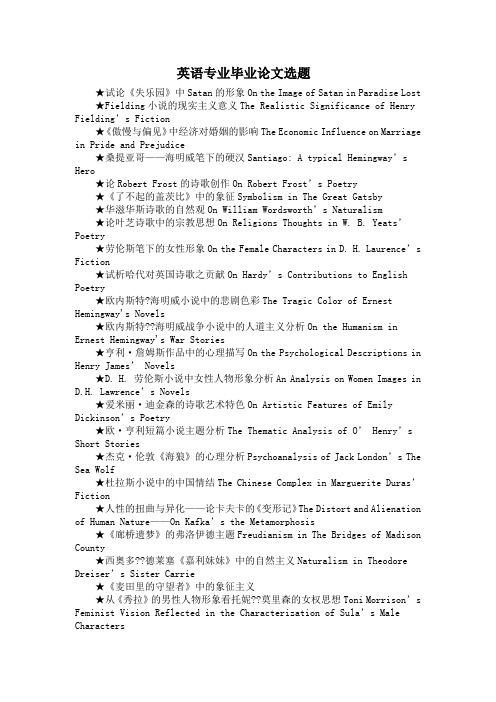
英语专业毕业论文选题★试论《失乐园》中Satan的形象On the Image of Satan in Paradise Lost ★Fielding小说的现实主义意义The Realistic Significance of Henry Fielding’s Fiction★《傲慢与偏见》中经济对婚姻的影响The Economic Influence on Marriage in Pride and Prejudice★桑提亚哥——海明威笔下的硬汉Santiago: A typical Hemingway’s Hero★论Robert Frost的诗歌创作On Robert Frost’s Poetry★《了不起的盖茨比》中的象征Symbolism in The Great Gatsby★华滋华斯诗歌的自然观On William Wordsworth’s Naturalism★论叶芝诗歌中的宗教思想On Religions Thoughts in W. B. Yeats’ Poetry★劳伦斯笔下的女性形象On the Female Characters in D. H. Laurence’s Fiction★试析哈代对英国诗歌之贡献On Hardy’s Contributions to English Poetry★欧内斯特?海明威小说中的悲剧色彩The Tragic Color of Ernest Hemingway's Novels★欧内斯特??海明威战争小说中的人道主义分析On the Humanism in Ernest Hemingway's War Stories★亨利·詹姆斯作品中的心理描写On the Psychological Descriptions in Henry James’ Novels★D. H. 劳伦斯小说中女性人物形象分析An Analysis on Women Images in D.H. Lawrence’s Novels★爱米丽·迪金森的诗歌艺术特色On Artistic Features of Emily Dickinson’s Poetry★欧·亨利短篇小说主题分析The Thematic Analysis of O’ Henry’s Short Stories★杰克·伦敦《海狼》的心理分析Psychoanalysis of Jack London’s The Sea Wolf★杜拉斯小说中的中国情结The Chinese Complex in Marguer ite Duras’ Fiction★人性的扭曲与异化——论卡夫卡的《变形记》The Distort and Alienation of Human Nature——On Kafka’s the Metamorphosis★《廊桥遗梦》的弗洛伊德主题Freudianism in The Bridges of Madison County★西奥多??德莱塞《嘉利妹妹》中的自然主义Naturalism in Theodore Dreiser’s Sister Carrie★《麦田里的守望者》中的象征主义★从《秀拉》的男性人物形象看托妮??莫里森的女权思想Toni Morrison’s Feminist Vision Reflected in the Characterization of Sula’s Male Characters★论马克吐温小说的黑色幽默On the Black Humor in Mark Twain Novels ★埃兹拉庞德诗歌的意象主义分析Imagism in Ezra Pound’s Poetry★从功能语法角度分析演讲词的语境和衔接Analysis on Textual Context and Cohesion in Speech Writing★大学生英语语用能力研究An Investigation of the Pragmatic Abilities of College Students★语用迁移与语用失误对跨文化交际的影响★语境再现在阅读理解中的作用★英汉致使动词的对比研究A Contrastive Study of English and Chinese Causative Verbs★英语委婉语的交际功能 A Contrastive Study of Lexical Features of English Advertisement and Chinese Advertisement★英语委婉语的文化内涵的研究Study of Culture Connotation of English Euphemism★后置形容词初探A Tentative Study of Post-posed Adjectives★跨文化交际中的语用失误Pragmatic Failures in Cross-cultural Communication★外语多媒体设计的语言学思考A Linguistic Point of View on Design of Foreign Language Multi-media★文化语境与词汇内涵意义( Context of Culture and Connotative Meaning of Words)★论新闻英语中的连贯问题On Coherence in News English★论语篇中的英语习语On English Idioms in Text★论形体语言在交际中的作用Functions of Body Language in Communication★英汉拒绝语的对比研究The Contrastive Study on the English and Chinese Expressions in Refusing or Declining★英汉习语的文化差异及翻译The Cultural Difference and Translation of English and Chinese idioms★英语典故性成语的来源与汉译Derivation and Translation of English Phrasal Literary Quotations★论as…as…的用法与翻译On the Use and Translation of “as…as…”★浅析汉英翻译种的中式英语On the Chinglish in C-E Translation★试论英汉翻译中的文化冲突A Study on Cultural Conflicts in E-C Translation★英汉翻译中修辞手段初探On Rhetorical Methods in E-C Translation ★英语课堂中的文化教学Culture Teaching in an EFL Class★论交际英语课堂教学的活动衔接On the Cohesiveness between Activities in a Communicative English Class★论中学生词汇学习策略On Vocabulary Learning Strategy for Middle School Students★试谈如何使用模拟辩论英语口语教学法The Teaching Methods by Means of Simulating Debate on Spoken English★英语教学中的文化意识Culture Consciousness in the English LanguageTeaching★文化差异与英语词汇教学Cultural Difference and Teaching of English Vocabulary★交际性语言与英语课堂语境构建Communicative language and the Construction of English Classroom Context★网络英语及其对英语教学的影响★合作学习在英语教学中的应用Application of Cooperative Learning To English Teaching★语境理论在英语阅读教学中的作用On Theory of Context In English Reading Teaching★如何有效地利用母语思维提高学生的英语写作能力On Effectively Applyin g First Language to Improving Students’ Writing Proficiency ★作文评阅中的困惑与自主学习理念的切入Evaluation on Compositions in ELT: Facilitating Students’ Autonomous Learning★学会学习——中国外语学习者学习策略研究Learn How to Learn——A Study on Chinese EFL learners’ Learning Strategies★英语听力学习策略对听力能力的影响Influence of Learning Strategies upon English Listening Comprehension★中学生英语学习动机与英语教学Middle School Students’ Learning Motivation and It’s Implications In ELT★减少焦虑:从英语课堂活动做起 Decreasing Anxiety Through ELT Classroom Activities★英语课堂中的互动:情感与认知 Interaction in EFL Classroom: Affection and Cognition★英语课堂中的文化冲击——促进学生积极参与之良方 Cultural Shock in ESL Classroom ——An Approaching to Encouraging Active Participation ★英语写作教学中的“结果法”与“过程法”之比较 A Comparison Between 〝Product Approach〞and〝Process Approach〞★元认知与大学英语词汇学习Metacognition and EFL Learners’ Vocabulary Learning★意识培养:英语语法教学的新思路The Awareness-raising Approach: A New Prospective on Grammar Teaching★语言学习任务和自主性学习On Language Learning Tasks and Learner Autonomy★课堂焦虑与中学生口语表达能力关系Correlations between Anxiety and College Students’ Oral Performance★阅读与写作的互动及其教学思考Developing Interactive Reading and Writing in Classroom Teaching★论外国文化知识在外语学习中的重要性On the Importance of Foreign Culture Knowledgein Foreign Language learning★翻译教学法之我见On the Teaching of Translation★影响EFL课堂互动的情感因素研究 A Study of the Affective Factors Influencing EFL Class Interaction★中学生词汇学习策略调查 A Survey to the Lexicon AcquisitionStrategies of Middle School Students★EFL课堂互动中教师的中介作用 A Study of the Teacher as Mediator in EFL Classroom Interaction★EFL课堂教学中的教师提问与课堂互动 A study to the role of question in EFL Classroom interaction★英语专业学生在写作中运用的交际策略研究 A study to the Application of Communicative Strategies in English Major’s Writing★EFL课堂教学心理环境调查与分析 An Investigation and Analysis to the Psychological Environment of EFL Class★英语专业与非专业学生英语学习风格对比研究 A contrastive study to the Learning styles of English Majors and Non-English Majors ★英语专业学生阅读策略调查研究A Survey to the Reading Strategies of English Majors★英语专业学生写作中的母语迁移现象 A Study to Native Language Transfer in English Major’s Writing★元认知策略在英语专业学生听力理解中的应用 A Study of the Application of Metacognitive Strategy in Listening Comprehension of English Majors★EFL课堂互动模式研究 A Study of the Interaction Patterns of EFL Class★EFL课堂互动中的错误纠正 A Study of Error Correction in EFL Classroom Interaction★英语专业学生学习动机调查与分析 A Survey and analysis to the Motivation of English Majors★英语教师课堂行为与学生学习动机相关研究 A Study to the Relationship between Teacher Behavior in classroom and Students’ Motivation★互动教学中语法教学的地位 The Role of Grammar Teaching in Interactive Teaching★听力理解中的形式逻辑问题研究On Formal Logic in listening comprehension of English★听力能力培养与词汇教学 on the cultivation of listening and teaching of vocabulary★刍议外报外刊阅读与英语阅读能力的培养On Reading Foreign Newspapers and Magazines and Reading Ability Training★英语教学中学生兴趣的激发Cultivation of Students’ Interest in English Teaching★怎样组织英语语言学教学中的课堂讨论How to Organize Linguistic Seminars in China★怎样充分利用第二课堂活动来提高学生语言技能与运用能力How to Make Full Use of the Extra Curricul um to Improve Students’ Language Skills their Applying Ability★阅读技巧与阅读能力培养Reading Skills and Reading Ability Training ★英语听力理解的主要障碍及对策Major Interferences in ListeningComprehension and its Counter-measures★英语语调教学探讨English Intonation Teaching Research★试析英语写作汉式英语产生的根源An Analysis of the Causes of Chinglish in English Writing★英汉语篇阅读模式差异对英语写作的影响The Influence of English and Chinese Context Patterns on English Writing★自我监控策略与二语写作:大学生英语写作策略研究Self-monitoring strategy and EFL Writing: A Strategy-base d study on Chinese Learners’ writing★影响中国中学生英语写作的因素Factors Affecting Chinese Middle School Students’ English Writing教师话语与第二语言习得Teacher Talk and Second Language Acquisition ★论泛读与词汇习得On the Role of Extensive Reading in Vocabulary Acquisition★英语词汇教学方法探讨An Inquiry into Teaching Approach to English Vocabulary★试论英美文化课程在英语专业能力培养中的作用On the Course of British and American Culture: Its Function in the Development of English Competence for English Majors★EFL课堂中的小组活动研究 A Study of Group Work in EFL Class★怎样组织英语语言学教学中的课堂讨论How to Organize Linguistic Seminars in China★试论英语专业人才如何突出专业优势The English Specialty: Ways Out ★英语流行语的文化因素Cultural Factors of English Catchwords★浅谈非语言交际中的身势语Body Language in Non verbal Communication ★英汉语中称谓的差异及其成因★英汉姓名的文化阐释Cultural Interpretations of English and Chinese Names★身势语在不同文化下的差异Different Body Languages In Different Cultures★英语语调在口头语篇中的意义The Communicative Value of Intonation in Spoken Discourse★On the politeness and cooperation used in the language learning ★语言学习中的礼貌和合作原则★非言语行为在跨文化交际中的功能Functions of Non-verbal Behavious in Intercultural communication★英汉礼貌用语对比研究The Contrastive Study on the Courteous Expressions in English and Chinese★中西方不同思维模式在宗教文化中的体现The Presentation of Different Thinking Modes in Chinese and Western Religious Culture赠送论文选题思路:毕业论文选题思路一、毕业论文选题思路确定选题是撰写论文的第一步工作。
英语专业毕业论文选题

英语专业非常非常棒的论题(经典收藏)关于各个方面的英语专业所需要的经典论题,仅供参考!Ⅰ. 英语教学Ⅱ. 英语语言及文化Ⅲ. 英汉翻译Ⅳ. 英美文学及其它Ⅰ. 英语教学1. A Study of the Development of English Language Teaching Methodologies2. The Application of Cooperative Learning Theory in Senior High School English Reading Teaching3. Interaction in Oral English Teaching4. On Developing English Reading Skills5. The Strategies of Topic Controlling in Spoken English6. Communicative Competence and Focused Task-based Teaching Approach7. Error Analysis and English Teaching8. On Developing English Reading Skills9. Interaction in Oral English Teaching10. Role-play in English Teaching11. Cultural Teaching in English in Middle School12. The Improvement of M iddle School Students’ Communicative Competence13. On Bilingual Teaching in Primary School14. Question-Design and its Influence in the Classroom Teaching15. Non-intelligence Factors in Promoting Students’ Potentialities in Learning English16. Autonomous Language Learning in CALL Environments17. On Attitude and Motivation in Second Language Learning18. Making Use of Resources on the Internet to Assist English Learning19. Task-based Approach in Reading Instruction20. The Study of Learner’s Motivation and its Influence upon Learners and their Learning Process21. On Communicative Competence22. Interaction and English Language Teaching23. Teacher’s Roles and their Impact upon Learner’s Learning Process24. Teaching Different Skills Based on the Interactive Approaches25. The Relationship between Affective State and Language Learning26. Errors and Language Learning27. Teacher-Talk in English Language Teaching Context28. Cognitivism and Teaching of Listening and Speaking29. A Survey of Students’ Motivation of Learning English30. Extracurricular Activities and English Teaching31. Cooperative Learning in Classroom Teaching32. Communicative Approach Employed in Grammar Teaching33. Multimedia and Its Effect on Language Learning/Teaching34. Reflections on CALL/CAI35. Network-based English Teaching of Reading/Writing/Listening36. Applying Task-based Teaching Principles to Organize Oral Activities37. Interactive Theory and the Teaching of Listening Comprehension38. Effective Ways to Improve Efficiency of Vocabulary Learning39. Improve Students' Oral Proficiency by Using Communicative Language Teaching Method40. Student-centered Approach in English Language Teaching41. Importance and Feasibility of Improving Students' Communicative Competence42. Learning Strategies in the Improvement of English Learning Efficiency43. How to Improve Students' Learning Style in Classroom Teaching44. The Role of Cultural Background Knowledge in English Study45. On English Vocabulary Acquisition46. Differences between American and British English47. English Ambiguity and Its Function48. Influence of Science and Technology on English Vocabulary49. A Study of Student-Centered English Vocabulary Teaching50. Factors Influencing English Learning and Possible Solutions51. Application of Non-verbal Communication in English Teaching52. Strategies on Intercultural Communication Training in English Teaching53. Reading Efficiently: An English Classroom Model Focusing on Students’ Reading Ability54. Factors Affecting English Listening55. Intensifying Cultural Awareness in Middle School English Teaching56. The Strategic Difference between Effective Listeners and Ineffective Listeners57. On Error-Correction Strategy in Oral English Classroom58. On the Use of Interactive Approach in Writing Instruction59. Collaborative Learning in Writing Instruction60. Motivation in English Learning61. Task-based Teaching in Writing62. The Brain-storming in English Writing63. Increasing Cultural Awareness in English Writing64. How to Improve the Students' Listening Ability Effectively in English Teaching65. Task-based Method of English Teaching in Middle Schools66. 英语单词科学记忆67. 如何提高英语阅读速度与质量68. 如何在阅读教学中培养学生的跨文化意识69. 如何在英语阅读教学中体现师生的互动70. 略论课外阅读与英语写作的关系71. 如何培养中学生的四项基本技能72. 如何提高中学生的英语写作水平73. 中学英语专业学生词汇量与阅读能力相关性研究74. 课堂里的艺术--口语教学研究75. 增强课堂活力-英语听力课的教学探索和实践76. 提高中学英语课堂教学质量的途径77. 快乐活动性原则及其在儿童英语教学中的应用78. 口语教学中的模拟训练方法79. 教师行动研究在中学英语教学中的应用80. 论多媒体辅助中学英语课堂教学的利与弊81. 浅谈新课标背景下中学英语课堂活动教学82. 论“互动”教学法提高英语学习兴趣的有效途径83. 中学英语阅读教学模式初探84. 中学生英语自主学习模式研究85. 课堂交互性调查--中方和外方教师课堂比较86. 如何利用多媒体辅助教学手段促进中学外语教学?87. 英语教学中语言与文化的关系88. 几种外语教学方法的比较89. 英语教学中的文化意识90. 英语教学中如何实施被动学习向主动学习的转化91. 英语阅读教学的发展趋势与探索92. 英语课堂教学中的双向交流93. 英语教学几种课型的安排94. 英语教学中的“互动”教学模式95. 多媒体英语教学与学生自主学习能力的培养96. 英语教学活动中作业布置法的实践与研究97. 论多媒体教学条件下的师生互动98. 论外语教学模式与中学生学习动机的相融性99. 双语教学实践与研究100.英语口语学习策略101.英语听力学习中的干扰因素分析102.任务型教学方法在中学外语教学中的应用研究103.非言语交际与外语教学104.焦虑对听力理解的影响105.论学习风格和英语成绩的关系106.互联网在外语教学中的作用107.课堂提问的方式和技巧108.高中生英语阅读教学中合作学习理论的运用109.中西文化差异与中国中学生中式英语结构Ⅱ. 英语语言及文化1. The Change of English Word Meaning: Factors and Types2. The Linguistic Characteristics of Advertising English3. On the Formation and Use of Parody in English and Chinese4. The Analysis on the Differences of Interpersonal Relationship between Eastern and Western People5. Research on Sino-Western Differences of Cooperative Principles6. The Comparison of Euphemism in Wording of Sino-Western Letters7. How to avoid ambiguity in different cultures8. On the Influence of Network Vocabulary on Chinese Language9. The Cultural Connotation of English Etymology and the Teaching of English Vocabulary10. An Analysis of the Political Prejudice in VOA11. American culture Reflected in the Use of Words of American English12. Translation of Brand Names and their Cultural Associations13. On Cultural Differences of Body Language between English and Chinese14. A Comparative Study on Sexism in both English and Chinese15. Euphemism—Construction and Application16. Cultural Comparison in Idioms17. The Effect of Context on the Meaning of Words18. Differences between Chinese and English Cultures with Regard to Taboos19. Differences between Chinese and English Cultures with Regard to Etiquette20. Similarities and Differences between Chinese and English Cultures in Terms of Proverbs21. The Influence of Exotic Cultures on English Vocabulary22. The Differences Between Chinese and Western Cultures and English Education23. 东西方人际关系要素差异探析24. 中西书信用语的委婉语比较25. 合作原则的中西方差异初探26. 如何避免由文化差异造成的歧义27. 英语网络词汇对汉语的影响28. 英语词源的文化内涵与词汇教学29. 从现代汉语中的英语外来词看中国文化对西方文化的吸收30. 中国学生英语习得中的母语迁移现象31. 论影响跨文化沟通的主要因素32. 英语教学中汉文化的参与和渗透33. 母语和第二语言阅读的文化差异与认知体系34. 英语写作中汉语干扰因素分析35. 类比在现代中英词汇中的应用36. 广告语篇翻译中的跨文化交际37. 英汉词汇的社会文化内涵漫谈38. 美语口语中的俚语现象透析39. 汉英颜色词背后的文化40. 英汉习语文化差异探源41. 浅析英语委婉语42. 被动意义表达的英汉对比研究43. 英汉复合名词对比研究44. 英汉否定表达比较研究45. 英汉语序比较与翻译问题研究46. 功能语言学与阅读教学47. 词汇教学方法与技巧48. 认知语法与句法教学49. 交际修辞的语用分析探究50. 语篇信息度的认知分Ⅲ. 英汉翻译1. On Foreignization and Domestication of Cultural Factors in Translation2. On Treatment of Cultural Factors in Translation3. On English Translation of Public Signs in Chinese4. On Translation of English Names of Commendation5. The relationship between Cultural Difference and Translation Skill6. An Approach to the Translation of Poetic Image7. A Study of the Chinese Version of Titles of English Films8. A Study of the Chinese Version of Titles of English Novels9. Foreignization and Translation of Idioms10. On Culture Translation under Foreignization11. On Literal Translation and Free Translation12. The Comparison and Translation of Chinese and English Idioms13. Equivalence and its Application in Translation14. Cultural Equivalence in Translation15. On Translating the Passive Voice16. On the Translation of English Long Sentences17. The Social and Cultural Factors in Translation Practice18. The Application of Functional Equivalence in English and Chinese Cross-cultural Translation19. On Chinese Translation of Journalistic English20. On the Criteria of Interpretation21. On the Unit of Translation22. The Cultural Differences and Arts of Translation in Advertising Language23. On Transformation between Parts of Speech in E-C Translation24. Exploring Substitution and Ellipsis in Translation25. The Analysis of Translation Style26. Cultural Differences and Translation Strategies27. A Contrastive Study of English and Chinese Allusions and their Translation28. English Neologisms in Newspaper and their Translation29. On Features of Journalistic English and its Translation30. Cultural Discrepancies and their Influences on Translation31. Translation of Address Term between English and Chinese32. On the Translation of English Pun into Chinese33. Features of Foreign Trade English and its Translation Model34. On Euphemism Translation35. Features of Tourism English and its Translation36. 论英汉翻译中外来词译法37. 影响长句翻译的因素38. 例析英译汉中形象语言的处理39. 生活中广告英语的翻译特色40. 翻译中的中国英语与中国式英语Ⅳ. 英美文学1. A Study of The Gift of Magi2. A Brief Comment on An American Tragedy4. Love Tragedy and War—An Analysis of A Farewell to Arms5. A Study of Sister Carrie6. The Evil of Mankind Portrayed in Moby Dick7. On Henry Heming in The Red Badge of Courage8. Emily Dickinson and her Poems9. Analysis of A Rose of Emily10. Analysis of the theme of Adventures of Huckleberry Finn11. On the symbolism of The Old Men and the Sea13. Deep Love And Deep Hatred—A Brief Analysis of Wuthering Heights14. Psychological Descriptions In Hemingway’s The Snows Of Kilimajaro15. On Ernest Hemingway And His Novel The Sun Also Rises16. The Literature Characteristics in A Tale of Two Cities17. On the Symbolism of D.H. Lawrence’s The Rainbow18. 《呼啸山庄》的悲剧分析19. 海明威英汉形象和冰山风格20. 《名利场》的现实意义21. 苔丝的形象分析22. 哈姆雷特的犹豫再探讨23. 爱伦坡小说的艺术创作成就24. 爱伦坡小说人物塑造25. 华兹华斯的语言风格26. 华兹华斯的自然观27. 简述哈代的悲剧性叙事艺术28. 浅析《失乐园》中撒旦的形象塑造29. 《还乡》的悲剧艺术特色30. 从《老人与海》看海明威的创作特点31. 论《白鲸》的象征含义32. 论简.奥斯汀对《爱玛》主人公的塑造33. 《红字》中的象征34. 哈姆雷特的人物特征及悲剧根源35. 杰克·伦敦的个人奋斗36. 《名利场》人物与艺术特色之分析37. 简论十九世纪英国女性生活38. 德莱塞的自然主义39. 论《天路历程》的象征和社会意义40. 《永别了武器》中主人公亨利形象分析How to Arouse Students’ Potentialities in Learning English by Using Non-intelligence Factors How to Make Use of Mother Tongue in English TeachingOn the Role of Affective Factors in English Teaching素质教育在英语学习中的体现大一新生英语学习策略使用状况调查研究新技术在大学英语教学中的运用对比分析在英语词汇教学中的运用如何提高英语阅读速度英语学习过程中文化自觉意识的培养motivation for english reading teaching英语词汇教学的交际化传统语法-翻译法与现代语法-翻译法的对比分析英语测验的设计(口语交际能力课堂培养模式探索)英语歌曲与英语语言的学习浅谈如何激发中学生英语学习的兴趣4.Grammar Teaching in Communicative Language Teaching6.The Role of Learner Differences in Foreign Language Learning英语教学中情感的重要意义小议影视作品名称的翻译英语中的缩略词经典英美电影赏析与英语学习绵阳市内主要景点英译现状的分析广告翻译中的文化因素。
初中英语阅读议论文
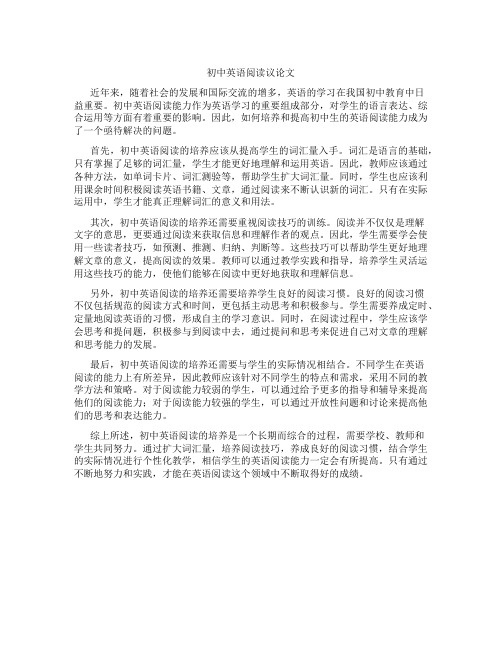
初中英语阅读议论文近年来,随着社会的发展和国际交流的增多,英语的学习在我国初中教育中日益重要。
初中英语阅读能力作为英语学习的重要组成部分,对学生的语言表达、综合运用等方面有着重要的影响。
因此,如何培养和提高初中生的英语阅读能力成为了一个亟待解决的问题。
首先,初中英语阅读的培养应该从提高学生的词汇量入手。
词汇是语言的基础,只有掌握了足够的词汇量,学生才能更好地理解和运用英语。
因此,教师应该通过各种方法,如单词卡片、词汇测验等,帮助学生扩大词汇量。
同时,学生也应该利用课余时间积极阅读英语书籍、文章,通过阅读来不断认识新的词汇。
只有在实际运用中,学生才能真正理解词汇的意义和用法。
其次,初中英语阅读的培养还需要重视阅读技巧的训练。
阅读并不仅仅是理解文字的意思,更要通过阅读来获取信息和理解作者的观点。
因此,学生需要学会使用一些读者技巧,如预测、推测、归纳、判断等。
这些技巧可以帮助学生更好地理解文章的意义,提高阅读的效果。
教师可以通过教学实践和指导,培养学生灵活运用这些技巧的能力,使他们能够在阅读中更好地获取和理解信息。
另外,初中英语阅读的培养还需要培养学生良好的阅读习惯。
良好的阅读习惯不仅包括规范的阅读方式和时间,更包括主动思考和积极参与。
学生需要养成定时、定量地阅读英语的习惯,形成自主的学习意识。
同时,在阅读过程中,学生应该学会思考和提问题,积极参与到阅读中去,通过提问和思考来促进自己对文章的理解和思考能力的发展。
最后,初中英语阅读的培养还需要与学生的实际情况相结合。
不同学生在英语阅读的能力上有所差异,因此教师应该针对不同学生的特点和需求,采用不同的教学方法和策略。
对于阅读能力较弱的学生,可以通过给予更多的指导和辅导来提高他们的阅读能力;对于阅读能力较强的学生,可以通过开放性问题和讨论来提高他们的思考和表达能力。
综上所述,初中英语阅读的培养是一个长期而综合的过程,需要学校、教师和学生共同努力。
通过扩大词汇量,培养阅读技巧,养成良好的阅读习惯,结合学生的实际情况进行个性化教学,相信学生的英语阅读能力一定会有所提高。
英语专业的毕业论文题目
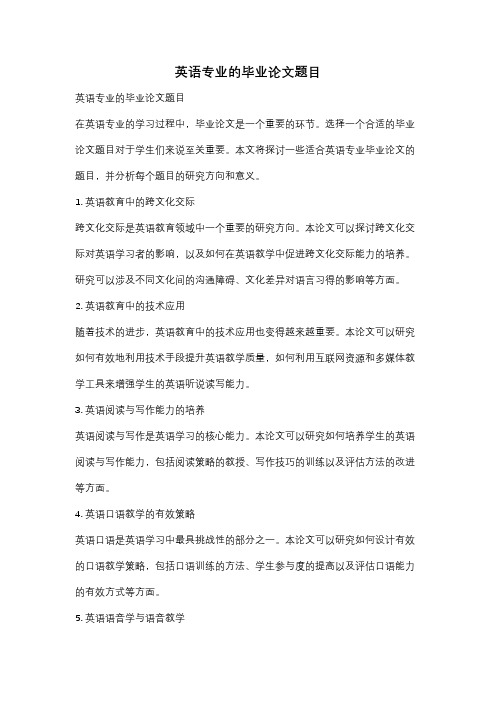
英语专业的毕业论文题目英语专业的毕业论文题目在英语专业的学习过程中,毕业论文是一个重要的环节。
选择一个合适的毕业论文题目对于学生们来说至关重要。
本文将探讨一些适合英语专业毕业论文的题目,并分析每个题目的研究方向和意义。
1. 英语教育中的跨文化交际跨文化交际是英语教育领域中一个重要的研究方向。
本论文可以探讨跨文化交际对英语学习者的影响,以及如何在英语教学中促进跨文化交际能力的培养。
研究可以涉及不同文化间的沟通障碍、文化差异对语言习得的影响等方面。
2. 英语教育中的技术应用随着技术的进步,英语教育中的技术应用也变得越来越重要。
本论文可以研究如何有效地利用技术手段提升英语教学质量,如何利用互联网资源和多媒体教学工具来增强学生的英语听说读写能力。
3. 英语阅读与写作能力的培养英语阅读与写作是英语学习的核心能力。
本论文可以研究如何培养学生的英语阅读与写作能力,包括阅读策略的教授、写作技巧的训练以及评估方法的改进等方面。
4. 英语口语教学的有效策略英语口语是英语学习中最具挑战性的部分之一。
本论文可以研究如何设计有效的口语教学策略,包括口语训练的方法、学生参与度的提高以及评估口语能力的有效方式等方面。
5. 英语语音学与语音教学英语语音学是研究语音和发音的学科,与英语教学息息相关。
本论文可以研究英语语音学在英语教学中的应用,包括语音教学的方法、学生发音问题的分析与解决等方面。
6. 英语翻译与口译英语翻译与口译是英语专业中重要的技能之一。
本论文可以研究翻译与口译的理论与实践,探讨翻译与口译过程中的问题和挑战,以及提出相应的解决方案。
7. 英语文学与文化研究英语文学与文化研究是英语专业中的一个重要领域。
本论文可以研究英语文学作品中的文化元素,探讨文学作品与社会、历史、文化背景之间的关系,并分析文学作品对于英语学习者的意义和价值。
以上仅是一些适合英语专业毕业论文的题目,每个题目都有其研究的方向和意义。
学生们可以根据自己的兴趣和专业背景选择合适的题目,并在论文中展开深入的研究。
英语教育专业毕业论文题目
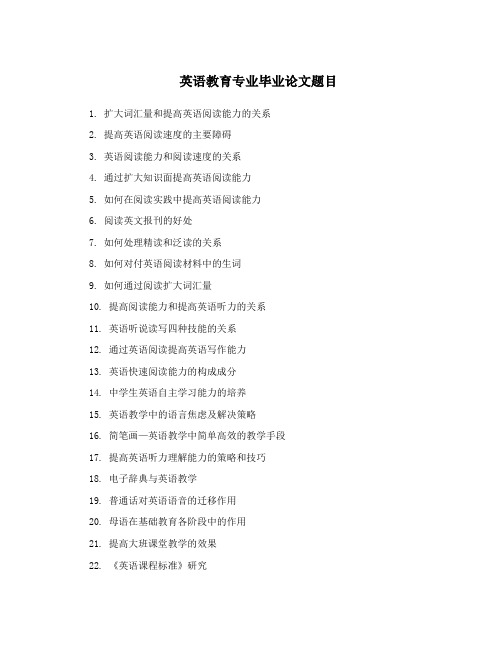
英语教育专业毕业论文题目1. 扩大词汇量和提高英语阅读能力的关系2. 提高英语阅读速度的主要障碍3. 英语阅读能力和阅读速度的关系4. 通过扩大知识面提高英语阅读能力5. 如何在阅读实践中提高英语阅读能力6. 阅读英文报刊的好处7. 如何处理精读和泛读的关系8. 如何对付英语阅读材料中的生词9. 如何通过阅读扩大词汇量10. 提高阅读能力和提高英语听力的关系11. 英语听说读写四种技能的关系12. 通过英语阅读提高英语写作能力13. 英语快速阅读能力的构成成分14. 中学生英语自主学习能力的培养15. 英语教学中的语言焦虑及解决策略16. 简笔画—英语教学中简单高效的教学手段17. 提高英语听力理解能力的策略和技巧18. 电子辞典与英语教学19. 普通话对英语语音的迁移作用20. 母语在基础教育各阶段中的作用21. 提高大班课堂教学的效果22. 《英语课程标准》研究23. 口语教学中教师的角色24. 从心理学角度探讨少儿英语教学25. 英语课堂提问的策略研究26. 英语后进生产生的原因以及补差方法研究27. 英语词汇教学方法探讨28. 小学生英语口语能力评估方法研究29. 朗读在英语教学中的作用30. 任务型教学法研究31. 方言对学生英语语音的影响32. 英语阅读课堂教学模式探讨33. 英语课堂的合作学习策略研究34. 中学生英语学习策略的培养35. 探究式教学法在中学英语教学中的应用36. 现代信息技术在英语教学中的应用37. 教师教学行为对英语学习的影响38. 实施成功教育减少两极分化39. 小学英语活动课教学模式研究40. 中学英语听力训练最佳方案41. 原版电影与英语学习42. 中学生英语兴趣的培养43. 《疯狂英语》(或各种教学方式)的利与弊44. 教学法实践调查报告45. 如何杜绝中式英语46. 英语教师的文化素养47. 网络时代如何学好英语48. 背景知识与阅读理解49. 上下文在阅读理解中的作用50. 家庭教师在中学生英语学习中的利弊51. 中学英语教学现状分析52. 中学英语课堂上的Daily Report53. 中外教师解释课文方法比较54. 中外教师课堂提问方法比较55. 中外教师课堂鼓励性用语比较56. 中外教师对学生总体要求之比较57. 计算机辅助英语教学中的诸问题58. 不同种类的计算机辅助英语教学方式59. 计算机辅助英语教学中的教学法原则60. 浅谈交际法语言教学的模式61. 认知风格差异及阅读思维训练62. 英语教学活动中作业布置法的实践和研究63. 现代教育技术手段运用于英语课堂64. 如何培养学生积极大胆的外语学习倾向65. 如何进行阅读理解训练66. 英语教学中汉文化的参与和渗透67. 试论母语在英语教学中的作用68. 如何上好小学英语复习课69. 小学生英语听力创新思维能力的培养70. 培养和提高英语听力理解能力的方法71. 巧用传媒资源优化英语教学72. 英语教学中交际教学思想在指导词汇教学中的作用73. 浅谈英语教学中词汇教学的艺术74. 低龄英语创新教学模式的尝试75. 肢体语言在低龄英语教学中的作用76. 英语课堂“交流—互动”教学的探索与实践77. 如何培养小学生的英语学习兴趣,78. 如何提高英语听力水平,79. 论如何加强英文报刊杂志对学生的辅导作用,80. 英教专业的大学生应具备哪些基本素质(技能),81. 怎样说一口流利,地道的英语,82. 如何促进英语听、说、读、写能力协调发展,83. 疯狂英语利与弊浅谈,84. 如何培养英语式思维,85. 英语学习者如何避免汉语式英语,86. 一名优秀的英语教师应具备哪些素质,87. 中学生英语自主学习能力的培养88. 简笔画-英语教学中简单高效的教学手段89. 从心理学角度探讨少儿英语教学90. 教师教学行为对高中生英语学习的影响91. 中学生英语兴趣的培养92. 英语教师的文化素养93. 家庭教师在中学生英语学习中的利弊94. 探究式教学法在中学英语教学中的应用95. 网络时代如何学好英语96. 中学英语课堂上的Daily Report97. 农村中学英语教学现状的调查与分析98. 小学英语教学存在的问题与改进措施99. 试论幼儿园英语教学的发展前景100. 如何培养和激发学生的学习兴趣101. 浅谈英语教学基本环节的实施102. 谈英语学习与文化学习的关系103. 谈课堂活动与学生自主学习的关系104. 谈教师与课堂活动中的角色105. 谈简笔画在英语教学中的作用106. 如何实施英语交际教学法107. 如何在英语学习中排除汉语的干扰108. 如何组织好课堂的教学109. 如何准备教案110. 如何扩大英语词汇111. 如何设计情景教学112. 如何提高英语听力113. How to arouse the Students’ interests in English learning 114. How to teach vocabulary in junior school115. How to assess students’ English learning116. The art of questioning in English class117. The communicative approach in English teaching118. Micro-teaching and Student Teacher Training119. English Test Design120. The Interference of Native Language in English Writing or Translation121. Translation Methods and English Teaching122. Question-Answer Technique and the Development of Speaking Ability。
(全英文论文)任务型教学法在初中英语阅读教学中的应用
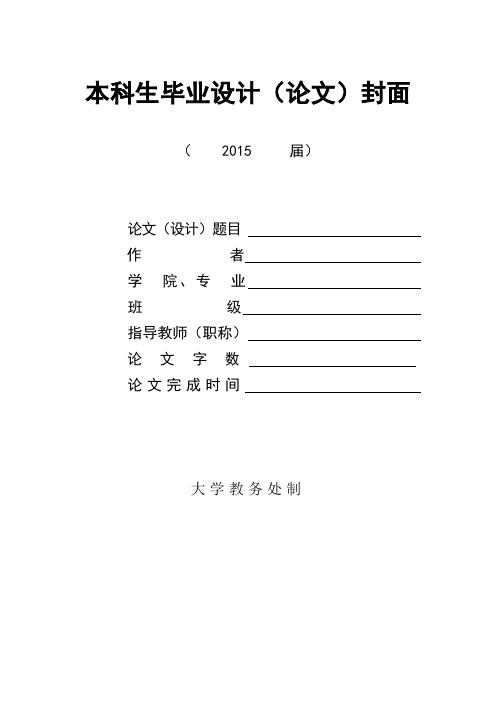
本科生毕业设计(论文)封面( 2015 届)论文(设计)题目作者学院、专业班级指导教师(职称)论文字数论文完成时间大学教务处制英语原创毕业论文参考选题(200个)一、论文说明本写作团队致力于英语毕业论文写作与辅导服务,精通前沿理论研究、仿真编程、数据图表制作,专业本科论文3000起,具体可以联系qq 805990749。
下列所写题目均可写作。
部分题目已经写好原创。
二、原创论文参考题目1、(英语毕业论文)从精神分析法解读《追风筝的人》的主题(开题报告+论文)2、(英语毕业论文)凯瑟琳•曼斯菲尔德短篇小说中的意识流技巧研究(开题报告+论文)3、(英语毕业论文)英式英语和美式英语中的词汇差异(开题报告+论文)4、(英语毕业论文)外语学习焦虑与口语成绩的相关性研究(开题报告+论文+文献综述)5、(英语毕业论文)浅析《宠儿》中三位黑人女性的身份寻求之旅(开题报告+论文+文献综述)6、(英语毕业论文)An Analysis of Hamlet’s Delay of Revenge in Hamlet7、(英语毕业论文)从文化角度论英汉语中的性别歧视8、(英语毕业论文)英语词汇中的性别歧视9、(英语毕业论文)从《丧钟为谁而鸣》看海明威的生死观10、(英语毕业论文)关于《麦田里的守望者》主人公霍尔顿悲剧人生的分析11、(英语毕业论文)On Translation of Cultural Factors in News under Skopostheorie (开题报告+论文+文献综述)12、(英语毕业论文)译者主体性视角下的翻译策略—杨氏夫妇《聊斋志异》英译本个案研究13、(英语毕业论文)影响大学生英语自主学习的因素研究(开题报告+论文)14、(英语毕业论文)论《愤怒的葡萄》中的生态批评思想(开题报告+论文)15、(英语毕业论文)探讨法国葡萄酒营销与中国白酒营销中的民族特色16、(英语毕业论文)从《灰姑娘》到《神谕女士》—浅谈反面母亲形象对子女成长的影响(开题报告+论文+文献综述)17、(英语毕业论文)A Popular Form of Subtitles Translation by Fansub Group on theInternet18、(英语毕业论文)通过对比研究看电影《小红帽》对经典童话小红帽的颠覆(开题报告+论文+文献综述)19、(英语毕业论文)浅析唐诗翻译的难点和策略(开题报告+论)20、(英语毕业论文)论《最后的莫西干人》中的印第安情结(开题报告+论文)21、(英语毕业论文)The Application of Symbolism in The Great Gatsby22、(英语毕业论文)探析《最蓝的眼睛》中女主人公的悲剧根源23、(英语毕业论文)A Study of Narrative Strategies in Beloved24、(英语毕业论文)英文电影片名翻译的归化与异化25、(英语毕业论文)《福尔摩斯历险》所折射的英国侦探小说的要素(开题报告+论文)26、(英语毕业论文)学习动机对大学生英语学习的影响(开题报告+论文+文献综述)27、(英语毕业论文)论《吉姆老爷》中的英雄主义(开题报告+论)28、(英语毕业论文)从艾米莉•狄金森与李清照的诗歌看女性文化差异(开题报告+论文)29、(英语毕业论文)Reconstruction of Black Identity in Toni Morrison’s Beloved(开题报告+论文+文献综述)30、(英语毕业论文)论中英商标翻译中的文化差异31、(英语毕业论文)浅析电影字幕翻译中文化意象的重构——《冰河世纪》两个翻译版本的对比分析(开题报告+论文+文献综述+外文翻译)32、(英语毕业论文)论《达芬奇密码》中的基督教元素(开题报告+论文)33、(英语毕业论文)用合作原则和礼貌原则分析网络聊天室会话的含义(开题报告+论文+文献综述)34、(英语毕业论文)在孤独中寻找自我——析《没有指针的钟》J.T.马龙的救赎35、(英语毕业论文)从违反合作原则研究《生活大爆炸》(开题报告+论文)36、(英语毕业论文)从语言角度看中英广告翻译中的文化差异37、(英语毕业论文)拜伦式人物—艾米莉•勃朗特——《呼啸山庄》的弗洛伊德解读(开题报告+论文+文献综述)38、(英语毕业论文)《喜福会》中的象征主义39、(英语毕业论文)凯瑟琳•曼斯菲尔德《苍蝇》反映的人性创伤分析(开题报告+论文)40、(英语毕业论文)奥斯卡•王尔德《快乐王子及其他》的唯美主义41、(英语毕业论文)师生关系与学生英语学习积极性之关联性探析(开题报告+论文)42、(英语毕业论文)The Transcultural Differences in the Translation of Commercial Advertisements43、(英语毕业论文)从《老人与海》看海明威小说中的英雄式人物的刻画44、(英语毕业论文)从self(自身)相关词看中国的集体主义和美国的个人主义45、(英语毕业论文)分析西方末世论在美国电影中的体现46、(英语毕业论文)初中英语的传统教学与现代教学的差异47、(英语毕业论文)Financial Translation Industrialization48、(英语毕业论文)论英语被动语态的语篇功能及其翻译策略—以《高级英语》第二册为例(开题报告+论文+文献综述+外文翻译)49、(英语毕业论文)用功能对等理论分析《经济学人》中的习语翻译(开题报告+论文)50、(英语毕业论文)《喜福会》中的中美文化冲突(开题报告+论文)51、(英语毕业论文)浅析从《刮痧》中反映出的中西文化差异52、(英语毕业论文)英语广告中仿拟的关联分析(开题报告+论文+文献综述+外文翻译)53、(英语毕业论文)《德伯家的苔丝》简写本与原著的语篇比较——基于倒装句的分析视角54、(英语毕业论文)《吉姆爷》的生态女性主义解读(开题报告+论文)55、(英语毕业论文)论新闻英语中的选词及其翻译56、(英语毕业论文)论希斯克利夫出走的必然性(开题报告+论文+文献综述+外文翻译)57、(英语毕业论文)论大学英语口语课外活动(开题报告+论文)58、(英语毕业论文)《宠儿》中塞斯的性格分析(开题报告+论文+文献综述)59、(英语毕业论文)The Influences of the Bible on Some American Movies60、(英语毕业论文)商务电子邮件中礼貌用语的运用(开题报告+论文+文献综述)61、(英语毕业论文)English Teaching and Learning in China's Middle School62、(英语毕业论文)浅析中西方饮食文化差异(开题报告+论文)63、(英语毕业论文)Pragmatic Study on the Humor Effect in The Big Bang Theory(开题报告+论文+文献综述)64、(英语毕业论文)显现的被动•隐现的自我——《看不见的人》中被动语态的身份建构功能研究65、(英语毕业论文)试析《生死疲劳》英文版风格之再现:文学文体学视角(开题报告+论文)66、(英语毕业论文)The Analysis of Promotion Strategy of L’Oréal in China67、(英语毕业论文)探究斯蒂芬•克莱恩诗集中的三类意象——以《黑骑者》为例68、(英语毕业论文)关于《飘》的中译本的翻译策略分析(开题报告+论文+文献综述)69、(英语毕业论文)企业英文简介中的概念语法隐喻分析(开题报告+论文+文献综述+外文翻译)70、(英语毕业论文)论《爱玛》中简•奥斯丁的女性主义观(开题报告+论文)71、(英语毕业论文)文化视角下的中西方时间观对比研究72、(英语毕业论文)从电视相亲节目看当代中美女性婚恋观差异(开题报告+论文+文献综述)73、(英语毕业论文)汉英姓氏文化差异(开题报告+论文)74、(英语毕业论文)艾米丽•狄金森诗歌中的自然情结(开题报告+论文)75、(英语毕业论文)希望失落的机械天堂——析《加算器》中的人性失落主题(开题报告+论文)76、(英语毕业论文)The Interpretation to Captain Ahab in Moby Dick through Abnormal Psychology77、(英语毕业论文)英汉谚语互译中的归化与异化策略分析(开题报告+论文+文献综述)78、(英语毕业论文)从《嘉莉妹妹》看现代女性的自我实现(开题报告+论文)79、(英语毕业论文)目的论视角下旅游景区公示语误译的研究(开题报告+论文)80、(英语毕业论文)对张爱玲与简•奥斯汀作品的比较性研究81、(英语毕业论文)从女性主义视角看幽默翻译82、(英语毕业论文)《红楼梦》两英译本中习语翻译的比较83、(英语毕业论文)《飘》两个中译本人名地名翻译对比研究(开题报告+论文)84、(英语毕业论文)维多利亚时期英国女性文学作品的三个男性形象分析85、(英语毕业论文)从语用角度探讨汉译英公示语86、(英语毕业论文)杰克•伦敦《热爱生命》中天气描写的作用87、(英语毕业论文)Psychological Analysis of Mabel and Fergusson in The Horse Dealer’s Daughter(开题报告+论文+文献综述)88、(英语毕业论文)英语非作格动词语义特征和句法属性研究(开题报告+论文+文献综述+外文翻译)89、(英语毕业论文)论奥斯卡•王尔德的唯美主义90、(英语毕业论文)英文电影片名汉译研究91、(英语毕业论文)《雾都孤儿》中的善与恶(开题报告+论文+文献综述)92、(英语毕业论文)《尤利西斯》与《春之声》中意识流手法的不同93、(英语毕业论文)A Comparison between Two Chinese Versions of Uncle Tom’s Cabin94、(英语毕业论文)《哈利•波特》的成功销售及其对中国儿童文学营销的启示95、(英语毕业论文)文化语境视域下英语习语的汉译研究(开题报告+论文)96、(英语毕业论文)从心理学角度探析爱米莉的爱情悲剧(开题报告+论文+文献综述)97、(英语毕业论文)论《推销员之死》中的父子关系98、(英语毕业论文)从《嘉莉妹妹》分析西奥多•莱塞对人性欲望的理解(开题报告+论文)99、(英语毕业论文)《动物庄园》中的黑色幽默分析100、(英语毕业论文)少儿英语学习中的情感因素分析(开题报告+论文+文献综述)101、(英语毕业论文)浅谈数字翻译中的文化因素102、(英语毕业论文)目的论下进口汽车说明书的翻译研究103、(英语毕业论文)从跨文化交际的角度研究广告翻译104、(英语毕业论文)威廉•麦克佩斯•萨克雷《名利场》的道德研究105、(英语毕业论文)An Analysis of Bernard Shaw’s Pygmalion from the Perspective of Interpersonal Function(开题报告+论文+文献综述)106、(英语毕业论文)海明威在《永别了,武器》中的反战情绪(开题报告+论文)107、(英语毕业论文)论中西教育观的差异(开题报告+论文+文献综述)108、(英语毕业论文)《宠儿》的黑人女性主义解读(开题报告+论)109、(英语毕业论文)英文电影字幕翻译的原则和技巧(开题报告+论文)110、(英语毕业论文)Black Women's Searching for Identity in Toni Morrison's Sula(开题报告+论文+文献综述)111、(英语毕业论文)从词汇对等角度看《红楼梦》中“笑”一词的英译(开题报告+论文)112、(英语毕业论文)角色扮演活动在小学英语教学中的应用113、(英语毕业论文)美剧字幕中的译者主体性——以美剧Gossip Girl第一季为例(开题报告+论文+文献综述+外文翻译)114、(英语毕业论文)解析《红字》中的红与黑115、(英语毕业论文)埃德加•爱伦•坡恐怖小说的哥特式特征分析116、(英语毕业论文)英语单位名词研究——以《牛津高阶英汉双解词典(第六版)》为例117、(英语毕业论文)论《劝导》中女性角色的地位(开题报告+论文)118、(英语毕业论文)《老人与海》中的存在主义分析(开题报告+论文)119、(英语毕业论文)The Interpretation to Captain Ahab in Moby Dick through Abnormal Psychology120、(英语毕业论文)跨文化交际中文化负迁移的原因及其对策研究(开题报告+论文)121、(英语毕业论文)三星公司营销策略研究(开题报告+论文)122、(英语毕业论文)构建和谐社会——以美籍黑人的种族歧视为例123、(英语毕业论文)美国基督新教与中国儒家的伦理道德的比较124、(英语毕业论文)对《宠儿》中黑奴母亲塞丝形象的探讨(开题报告+论文+文献综述)125、(英语毕业论文)Where Should Gone With the Wind Go?——Study on The Disputes Among Critics of Gone With the Wind126、(英语毕业论文)《睡谷的传说》中理想与现实的矛盾(开题报告+论文)127、(英语毕业论文)探析《呼啸山庄》男女主人公爱情悲剧的根源(开题报告+论文+文献综述)128、(英语毕业论文)英汉化妆品说明书对比及汉译策略(开题报告+论文+文献综述+外文翻译)129、(英语毕业论文)从电影功夫字幕翻译谈文化负载词的翻译(开题报告+论文)130、(英语毕业论文)女性哥特视角下的《蝴蝶梦》研究(开题报告+论文)131、(英语毕业论文)汉英翻译中文化传递的可接受度(开题报告+论文)132、(英语毕业论文)从女性主义解读《威尼斯商人》(开题报告+论文+文献综述)133、(英语毕业论文)中餐菜谱翻译的错误分析134、(英语毕业论文)高中英语“后进生”产生的原因以及补差方法研究135、(英语毕业论文)《小妇人》与《傲慢与偏见》中女性爱情观对比研究136、(英语毕业论文)《名利场》中蓓基人物形象分析137、(英语毕业论文)浅析英汉基本颜色词之文化内涵--以“白”与“黑”为例138、(英语毕业论文)汽车广告英语的语言特点及其翻译139、(英语毕业论文)Feminism in To the Lighthouse140、(英语毕业论文)英语新闻的用词和翻译(开题报告+论文+文献综述)141、(英语毕业论文)从《野性的呼唤》看杰克・伦敦的人生观142、(英语毕业论文)惠特曼的人文主义思想对美国现代诗歌创作和中国诗歌创作的影响——以《自我之歌》为例143、(英语毕业论文)从浪漫主义角度剖析《海上钢琴师》在中国流行的原因(开题报告+论文)144、(英语毕业论文)女性主义视角下《傲慢与偏见》的情态意义解读145、(英语毕业论文)违反合作原则所表达的会话含义—以《越狱》中Theodore Bagwell话语为例(开题报告+论文+文献综述+外文翻译)146、(英语毕业论文)An Analysis of Hardy’s Optimism in Jude the Obscure(开题报告+论文+文献综述)147、(英语毕业论文)《人性的污点》中主要人物的悲剧命运与社会原因的分析148、(英语毕业论文)《傲慢与偏见》中伊丽莎白的性格分析149、(英语毕业论文)浅析《了不起的盖茨比》的主要人物性格(开题报告+论文+文献综述)150、(英语毕业论文)论《米德尔马契》中的人性主题151、(英语毕业论文)汽车广告中的中西文化差异研究(开题报告+论文+文献综述)152、(英语毕业论文)初中英语课堂教学现状调查(开题报告+论文+文献综述)153、(英语毕业论文)从社会符号学角度浅谈汉语“一”字成语翻译(开题报告+论文+文献综述+外文翻译)154、(英语毕业论文)An Analysis of The Call of the Wild from the Perspective of Existentialism(开题报告+论文+文献综述)155、(英语毕业论文)华盛顿•欧文与陶渊明逃遁思想对比研究156、(英语毕业论文)从《喜福会》中透视文化的冲突与融合157、(英语毕业论文)从中美送礼习俗分析两国文化价值观的差异158、(英语毕业论文)从好莱坞电影看美国的文化霸权159、(英语毕业论文)论《呼啸山庄》中男女主人公对真爱的追求160、(英语毕业论文)从语域理论角度分析商务发盘函的翻译策略161、(英语毕业论文)对《老人与海》中圣地亚哥的性格分析162、(英语毕业论文)从文学伦理阐释《榆树下的欲望》母杀子的悲剧(开题报告+论文)163、(英语毕业论文)浅论中文商标的翻译(开题报告+论)164、(英语毕业论文)英语X-ful词的形态与认知构建(开题报告+论文+文献综述+外文翻译)165、(英语毕业论文)《汤姆叔叔的小屋》人物性格的宗教色彩剖析166、(英语毕业论文)Advertising and Its Application167、(英语毕业论文)互动在高中英语阅读课的应用(开题报告+论文+文献综述)168、(英语毕业论文)大学生英语听力两种辅助活动实证研究169、(英语毕业论文)英语委婉语的表达模式和应用170、(英语毕业论文)国际商务英语合同翻译策略研究(开题报告+论文)171、(英语毕业论文)爱伦坡短片小说“美女之死”主题研究172、(英语毕业论文)卡森•麦卡勒斯《心是孤独的猎手》福柯式解读(开题报告+论文)173、(英语毕业论文)《小城畸人》里的象征主义手法分析(开题报告+论文)174、(英语毕业论文)浅析艾米丽•迪金森诗歌的主题思想(开题报告+论文+文献综述)175、(英语毕业论文)An Analysis of the Cultural Identity in Amy Tan’s The Joy Luck Club176、(英语毕业论文)On Michael Moore's Fahrenheit / From the Rhetoric Perspective 177、(英语毕业论文)分析埃里森《隐形人》中美国的种族歧视178、(英语毕业论文)探讨法国葡萄酒营销与中国白酒营销中的民族特色179、(英语毕业论文)A Study of the Characters and Their Influence on the Hero of The Catcher in the Rye180、(英语毕业论文)探析《越狱》中Michael的性格特征及成因181、(英语毕业论文)用交际翻译理论看英语文学书名汉译(开题报告+论文+文献综述)182、(英语毕业论文)浅谈罗密欧与朱丽叶的爱情悲剧183、(英语毕业论文)从禁忌语看中西文化差异184、(英语毕业论文)从十字军东征看中世纪宗教冲突(开题报告+论文+文献综述)185、(英语毕业论文)影响英语专业学生理解英语习语的因素调查(开题报告+论文)186、(英语毕业论文)《小妇人》中教养方式的分析(开题报告+论文+文献综述)187、(英语毕业论文)从《杀死一只知更鸟》看家庭教育学188、(英语毕业论文)旅游翻译中的跨文化语用失误(开题报告+论文+文献综述)189、(英语毕业论文)中西方在养老孝道方面的差异(开题报告+论文)190、(英语毕业论文)《圣经<箴言>》的修辞分析191、(英语毕业论文)主位推进模式在语篇翻译中的应用(开题报告+论文)192、(英语毕业论文)对《斯佳丽》中生态女权主义的解读(开题报告+论文)193、(英语毕业论文)传统美德与反传统个性的结合——《小妇人》中乔的形象分析194、(英语毕业论文)从符号学理论角度探讨网络命名的文化倾向195、(英语毕业论文)大学英语电影教学现状及对策分析(开题报告+论文+文献综述)196、(英语毕业论文)影响英语专业学生阅读理解因素的分析及对策探讨(开题报告+论文+文献综述)197、(英语毕业论文)从保罗的恋母情结角度分析劳伦斯的《儿子与情人》198、(英语毕业论文)从自私基因论分析《伊索寓言》的寓意199、(英语毕业论文)浅析信息时代的汉语新词语英译策略200、(英语毕业论文)从中西文化差异看英汉数字翻译(开题报告+论文)。
英语专业本科毕业论文选题参考之欧阳家百创编
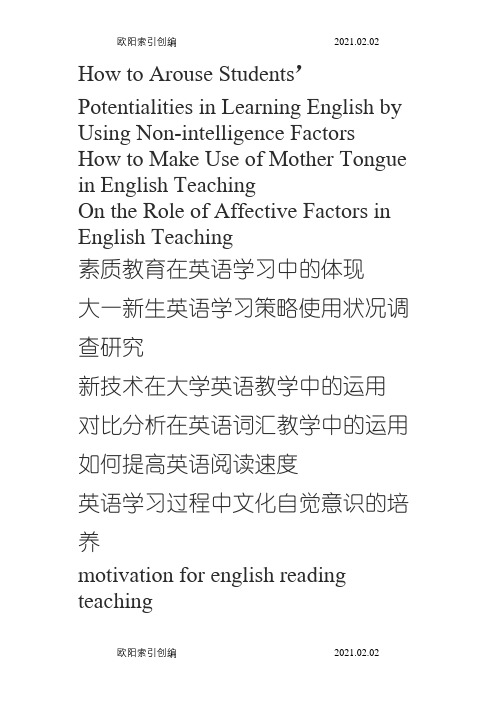
How to Arouse Students’Potentialities in Learning English by Using Non-intelligence FactorsHow to Make Use of Mother Tongue in English TeachingOn the Role of Affective Factors in English Teaching素质教育在英语学习中的体现大一新生英语学习策略使用状况调查研究新技术在大学英语教学中的运用对比分析在英语词汇教学中的运用如何提高英语阅读速度英语学习过程中文化自觉意识的培养motivation for english reading teaching英语词汇教学的交际化传统语法-翻译法与现代语法-翻译法的对比分析英语测验的设计(口语交际能力课堂培养模式探索)英语歌曲与英语语言的学习浅谈如何激发中学生英语学习的兴趣4.Grammar Teaching in Communicative Language Teaching 6.The Role of Learner Differences in Foreign Language Learning英语教学中情感的重要意义小议影视作品名称的翻译英语中的缩略词经典英美电影赏析与英语学习绵阳市内主要景点英译现状的分析广告翻译中的文化因素。
On Translation of English and Chinese Film TitlesThe Cultural Elements in Advertisement TranslationThe Translations of Culture-loaded WordsViews on the Chinese Version of Emma《雨中猫》中女性意识的崛起论《雨中猫》的多重主题《老人与海》中海明威写作风格和手法从《蝇王》看人性的善与恶解读《教长的黑面纱》《欲望号街车》的幻想与现实的对立<<欲望之渊,悲剧之源>>---浅析<<榆树下的欲望>>A Character Analysis of the Heroine of Emma《茶花女》主人公玛格丽特的悲剧《恋爱中的女人》中两姐妹性格异同对比《汤姆叔叔的小屋》在美国历史上的重要性《红与黑》中主人公于连的性格分析《了不起的盖次比》的象征主义特点论《红字》的人物塑造《傲慢与偏见》中的书信分析Dream—Willy’s Reality Evasion DrugOn Translating English Book Titles into ChineseCultural Gaps and Untranslatability The Great Translator Yan FuHow to Realize Culture-Functional Equivalent Effect in Translating Traditional Chinese Medicine Terms 从目的论角度看影视名称翻译文化差异与广告语翻译许渊冲翻译研究论直译与意译小议文学作品名称的翻译习语翻译中的文化差异文学作品中颜色词的翻译小议影视作品名称的翻译文学作品中称谓的翻译试论语境在翻译过程中的作用试论广告英语的翻译特点汉英中的文化空缺及其翻译对策试论旅游英语的翻译特点英语新闻标题的语法特点分析英汉思维差异对其翻译的影响The Studies of Translation Teaching 语音与音韵在语篇组织过程中的作用英语语调的信息功能分析科技英语的名词化结构和语法比喻分析语境与理解语用学与翻译礼貌---交际策略中英禁忌语对比研究从“狗”和“龙”的谚语看东西方文化差异英语中的歧义与双关英语新词新意探究论第二语言习得中动机因素的影响二语言习得中的洋泾浜化和克里奥耳化现象英语中的缩略词论中文标语(口号语)的英译论英汉称谓语的差异文化背景差异与翻译论以学生为主的英语教学论中美时间观的文化差异论英语教学中非言语行为的运用论中学英语词汇教学策略论将中国文化融入中学英语教育论背景知识在英语阅读理解中的作用中美校园文化比较研究试论英语报刊阅读在英语学习中的作用英语新闻标题特点及翻译中西文化差异对英语阅读的影响经典英美电影赏析与英语学习浅谈学习者内在因素对英语学习的影响意识形态与新闻翻译文学翻译中译者的主体性论英汉双关语的翻译英汉形合意合的对比及其对翻译的启示英汉成语与翻译浅谈商标名的翻译化妆品广告的翻译对等原则下的广告翻译策略论旅游指南中文化负载词的英译论中国地名的英译文化翻译中的异化策略和《三国演义》中的习语翻译绵阳市内主要景点英译现状的分析汉语量词的英译初探英汉习语对比及其翻译因特网对汉英翻译实践的影响关于《红楼梦》翻译的同化和归化从《红楼梦》两译本看译者的主体性从《红楼梦》中诗词的翻译看翻译中的理解中英文化与英汉翻译译者的主体性与翻译的标准简论理解在翻译中的作用商业价值原则对电影片名翻译的影响。
英语阅读毕业论文
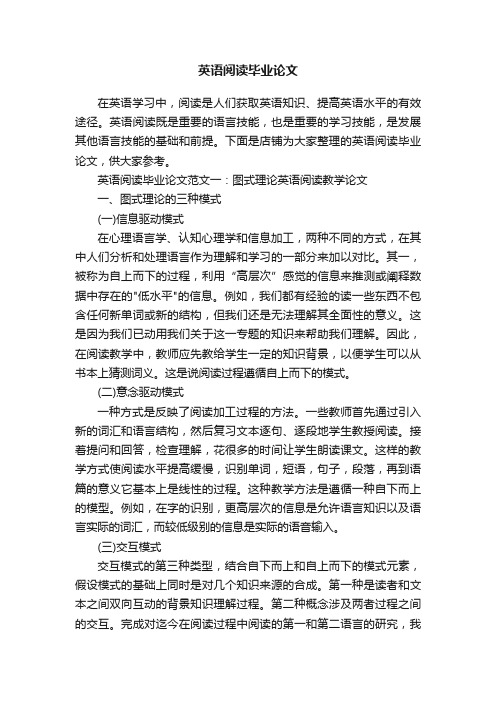
英语阅读毕业论文在英语学习中,阅读是人们获取英语知识、提高英语水平的有效途径。
英语阅读既是重要的语言技能,也是重要的学习技能,是发展其他语言技能的基础和前提。
下面是店铺为大家整理的英语阅读毕业论文,供大家参考。
英语阅读毕业论文范文一:图式理论英语阅读教学论文一、图式理论的三种模式(一)信息驱动模式在心理语言学、认知心理学和信息加工,两种不同的方式,在其中人们分析和处理语言作为理解和学习的一部分来加以对比。
其一,被称为自上而下的过程,利用“高层次”感觉的信息来推测或阐释数据中存在的"低水平"的信息。
例如,我们都有经验的读一些东西不包含任何新单词或新的结构,但我们还是无法理解其全面性的意义。
这是因为我们已动用我们关于这一专题的知识来帮助我们理解。
因此,在阅读教学中,教师应先教给学生一定的知识背景,以便学生可以从书本上猜测词义。
这是说阅读过程遵循自上而下的模式。
(二)意念驱动模式一种方式是反映了阅读加工过程的方法。
一些教师首先通过引入新的词汇和语言结构,然后复习文本逐句、逐段地学生教授阅读。
接着提问和回答,检查理解,花很多的时间让学生朗读课文。
这样的教学方式使阅读水平提高缓慢,识别单词,短语,句子,段落,再到语篇的意义它基本上是线性的过程。
这种教学方法是遵循一种自下而上的模型。
例如,在字的识别,更高层次的信息是允许语言知识以及语言实际的词汇,而较低级别的信息是实际的语音输入。
(三)交互模式交互模式的第三种类型,结合自下而上和自上而下的模式元素,假设模式的基础上同时是对几个知识来源的合成。
第一种是读者和文本之间双向互动的背景知识理解过程。
第二种概念涉及两者过程之间的交互。
完成对迄今在阅读过程中阅读的第一和第二语言的研究,我们知道阅读集成了几种技巧策略,它不是一个简单的事件描述而是有目的的,互动的,理解的,灵活的,并逐渐发展。
图式有序地在大脑记忆中储存预设对信息处理体系尤为重要。
我们可以三种模式相结合,帮助培养学生的阅读策略和提高语言运用的效率。
东华理工大学行知分院毕业论文参考题目
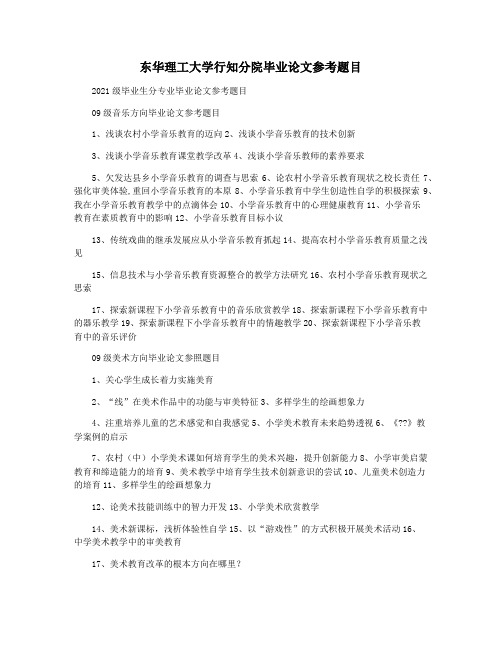
东华理工大学行知分院毕业论文参考题目2021级毕业生分专业毕业论文参考题目09级音乐方向毕业论文参考题目1、浅谈农村小学音乐教育的迈向2、浅谈小学音乐教育的技术创新3、浅谈小学音乐教育课堂教学改革4、浅谈小学音乐教师的素养要求5、欠发达县乡小学音乐教育的调查与思索6、论农村小学音乐教育现状之校长责任7、强化审美体验,重回小学音乐教育的本原8、小学音乐教育中学生创造性自学的积极探索9、我在小学音乐教育教学中的点滴体会10、小学音乐教育中的心理健康教育11、小学音乐教育在素质教育中的影响12、小学音乐教育目标小议13、传统戏曲的继承发展应从小学音乐教育抓起14、提高农村小学音乐教育质量之浅见15、信息技术与小学音乐教育资源整合的教学方法研究16、农村小学音乐教育现状之思索17、探索新课程下小学音乐教育中的音乐欣赏教学18、探索新课程下小学音乐教育中的器乐教学19、探索新课程下小学音乐教育中的情趣教学20、探索新课程下小学音乐教育中的音乐评价09级美术方向毕业论文参照题目1、关心学生成长着力实施美育2、“线”在美术作品中的功能与审美特征3、多样学生的绘画想象力4、注重培养儿童的艺术感觉和自我感觉5、小学美术教育未来趋势透视6、《??》教学案例的启示7、农村(中)小学美术课如何培育学生的美术兴趣,提升创新能力8、小学审美启蒙教育和缔造能力的培育9、美术教学中培育学生技术创新意识的尝试10、儿童美术创造力的培育11、多样学生的绘画想象力12、论美术技能训练中的智力开发13、小学美术欣赏教学14、美术新课标,浅析体验性自学15、以“游戏性”的方式积极开展美术活动16、中学美术教学中的审美教育17、美术教育改革的根本方向在哪里?18、在美术教学中发展儿童的形象思维19、美术教学运用鼓励性评价的深入探讨20、儿童绘画与小学生素质的培育21、素描教学的方法和艺术22、充分发挥美术教学中的范画作用23、小学美术创作课的课型设计24、多媒体在美术教学中的运用25、美术教育中手工作品教学法研究26、变形画及观察与思维27、农村中小学美术教学方法新探28、农村中小学美术教育现状与对策研究29、美术课中如何体现创造乐趣30、浅谈美术课堂教学中教师的指导作用09级数学方向毕业论文参照题目1.如何提高小(中)学数学教学效率2.小(中)学数学教学中存在的问题及对策3.现代农村小(中)学数学教学现状分析和反思4.多媒体技术与小(中)学数学教学5.新形势下小(中)学数学教师应具备素质6.当前我市小(中)学数学教学存在的弊端与对策7.小(中)学数学教学现状的思考与对策8.对小(中)学数学教学方法的几点思考9.新课程对小(中)学数学教师的新要求10.小(中)学数学教学过程中如何激发学生的学习兴趣11.小(中)学数学课堂教学策略12.新一轮课程改革中小(中)学数学课堂教学13.素质教育背景下的小(中)数学教学思考14.农村大(中)学数学教学资源利用现状的调查与思考15.如何培育初中生的数学逻辑思维能力16.大(中)学数学课堂教学中的师生互动17.关于小(中)学数学教学方法改革的研究与思考18.小(中)学数学教学中创新能力的培养19.小(中)学数学开放式教学之我见20.如何提高学生的数学解题能力09级语文方向毕业论文参照题目-1、析古今形容词的异同2、论汉语的被动句式的发展变化3、古今汉语的词序比较4、古今表疑问的表达形式异同5、文学思潮评论6、教学法研究7、二十世纪中国作家及其创作研究例如:王国维文艺观的现代特征、冰心散文的艺术风格、徐志摩的康桥理想、巴金创作风格的转型、沈从文小说中的人性小庙、余华创作中的暴力与丧生、史铁生的存活体验及其创作,等等。
英语专业论文题目分类
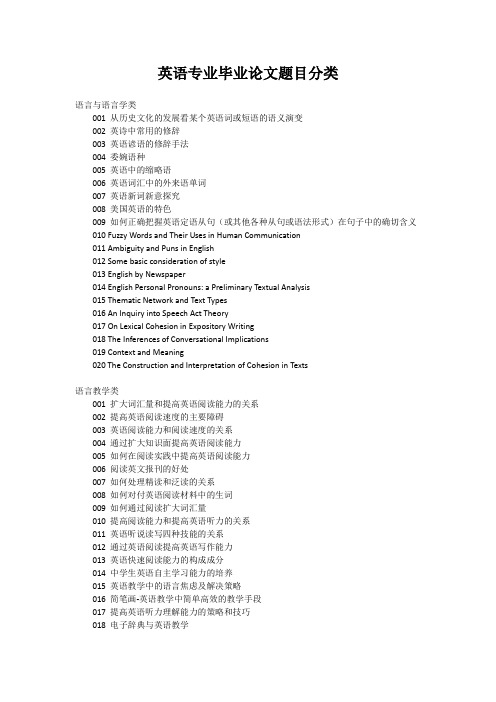
英语专业毕业论文题目分类语言与语言学类001 从历史文化的发展看某个英语词或短语的语义演变002 英诗中常用的修辞003 英语谚语的修辞手法004 委婉语种005 英语中的缩略语006 英语词汇中的外来语单词007 英语新词新意探究008 美国英语的特色009 如何正确把握英语定语从句(或其他各种从句或语法形式)在句子中的确切含义010 Fuzzy Words and Their Uses in Human Communication011 Ambiguity and Puns in English012 Some basic consideration of style013 English by Newspaper014 English Personal Pronouns: a Preliminary Textual Analysis015 Thematic Network and Text Types016 An Inquiry into Speech Act Theory017 On Lexical Cohesion in Expository Writing018 The Inferences of Conversational Implications019 Context and Meaning020 The Construction and Interpretation of Cohesion in Texts语言教学类001 扩大词汇量和提高英语阅读能力的关系002 提高英语阅读速度的主要障碍003 英语阅读能力和阅读速度的关系004 通过扩大知识面提高英语阅读能力005 如何在阅读实践中提高英语阅读能力006 阅读英文报刊的好处007 如何处理精读和泛读的关系008 如何对付英语阅读材料中的生词009 如何通过阅读扩大词汇量010 提高阅读能力和提高英语听力的关系011 英语听说读写四种技能的关系012 通过英语阅读提高英语写作能力013 英语快速阅读能力的构成成分014 中学生英语自主学习能力的培养015 英语教学中的语言焦虑及解决策略016 简笔画-英语教学中简单高效的教学手段017 提高英语听力理解能力的策略和技巧018 电子辞典与英语教学019 普通话对英语语音的迁移作用020 母语迁移在基础教育各阶段中的作用021 提高大班课堂教学的效果022 《英语课程标准》研究023 口语教学中教师的角色024 从心理学角度探讨少儿英语教学025 英语课堂提问的策略研究026 英语后进生产生的原因以及补差方法研究027 英语词汇教学方法探讨028 小学生英语口语能力评估方法研究029 朗读在英语教学中的作用030 任务型教学法研究031 方言对学生英语语音的影响032 英语阅读课堂教学模式探讨033 英语课堂的合作学习策略研究034 中学生英语学习策略的培养035 探究式教学法在中学英语教学中的应用036 现代信息技术在英语教学中的应用037 教师教学行为对高中生英语学习的影响038 实施成功教育减少两极分化039 小学英语活动课教学模式研究040 中学英语听力训练最佳方案041 原版电影与英语学习042 中学生英语兴趣的培养043 《疯狂英语》(或各种教学方式)的利与弊044 张思中教学法实践调查报告045 如何杜绝中式英语046 英语教师的文化素养047 网络时代如何学好英语048 背景知识与阅读理解049 上下文在阅读理解中的作用050 家庭教师在中学生英语学习中的利弊051 中学英语教学现状分析052 中学英语课堂上的Daily Report053 中外教师解释课文方法比较054 中外教师课堂提问方法比较055 中外教师课堂鼓励性用语比较056 中外教师对学生总体要求之比较057 计算机辅助英语教学中的诸问题058 不同种类的计算机辅助英语教学方式059 计算机辅助英语教学中的教学法原则060 The Instructive Meaning of Inter-language Pragmatics for foreign Language Teaching 061 Pedagogical Translation and Translation Teaching062 The Importance of Cultural Authenticity in Teaching Materials063 Micro-teaching and Student Teacher Training064 How to Evaluate the Teacher Performance - A Case Study065 English Test Design066 The Interference of Native Language in English Writing or Translation 067 Translation Methods and English Teaching翻译类001 英汉文化差异和翻译002 英语习语翻译003 翻译与语境004 翻译中的对等问题005 翻译中的衔接与连贯006 翻译中的文化信息传递007 语篇体裁与翻译策略008 汉语四字词语的翻译009 数字的翻译010 翻译中的语序转换011 谈英语被动句的翻译012 英汉句法对比和翻译013 谈合同(或其他各种类型文本)的翻译014 英语否定句的翻译015 广告英语及其翻译016 中国特色词汇及其英译017 英语长句的理解与翻译018 商号、商标、公司名称等的翻译019 Importance of Meaning Group in Translation文学类001 文学批评方法之我见002 解读布莱克诗篇《老虎》的象征意义003 弥尔顿创作目的和结果的矛盾之我见004 华滋华斯诗歌的自然观005 简析《秋颂》的美学价值006 由《云雀颂》看雪莱的诗歌创作观007 论叶芝诗歌中的象征主义008 狄金森诗歌的现实意义009 论现代诗歌与后现代诗歌的异同010 解读《麦克白》的创作意义011 由海明威的《杀人者》理解客观叙述法012 解读福克纳的《干燥七月》013 中外文学作品比较014 不同英语文作品比较015 英文作品中的人物分析016 英文作品的社会意义017 英文作品的文体风格。
英语教学论文10篇
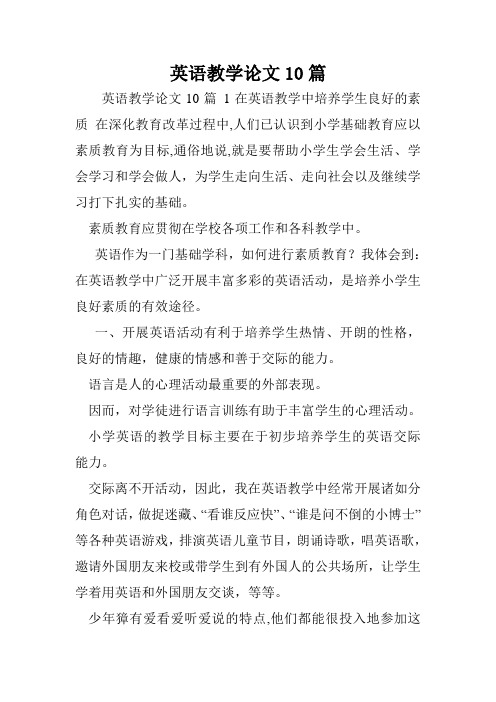
英语教学论文10篇英语教学论文10篇1在英语教学中培养学生良好的素质在深化教育改革过程中,人们已认识到小学基础教育应以素质教育为目标,通俗地说,就是要帮助小学生学会生活、学会学习和学会做人,为学生走向生活、走向社会以及继续学习打下扎实的基础。
素质教育应贯彻在学校各项工作和各科教学中。
英语作为一门基础学科,如何进行素质教育?我体会到:在英语教学中广泛开展丰富多彩的英语活动,是培养小学生良好素质的有效途径。
一、开展英语活动有利于培养学生热情、开朗的性格,良好的情趣,健康的情感和善于交际的能力。
语言是人的心理活动最重要的外部表现。
因而,对学徒进行语言训练有助于丰富学生的心理活动。
小学英语的教学目标主要在于初步培养学生的英语交际能力。
交际离不开活动,因此,我在英语教学中经常开展诸如分角色对话,做捉迷藏、“看谁反应快”、“谁是问不倒的小博士”等各种英语游戏,排演英语儿童节目,朗诵诗歌,唱英语歌,邀请外国朋友来校或带学生到有外国人的公共场所,让学生学着用英语和外国朋友交谈,等等。
少年獐有爱看爱听爱说的特点,他们都能很投入地参加这此有趣的英语活动。
去年五月,我邀请了英国的希尔夫妇来校和学生联欢。
同学们有礼貌地用“Welcome to China! ““Welcome to our school!“等情真意切的语言欢迎他们。
听他们介绍了情况后,同学们热切地向他们提了许多问题:“Do you like China?“ “How many people are there in your family?“希尔夫妇在回答问题后,也向同学们提了一些问题.同学们争先恐后举手,清楚流利地一一作答.同学们还三两人一组主动地走到客人面前,先自我介绍: “My name is Wang Xi. My English name is Mike.“然后介绍自己的同学: “This is Xing Li“两人一起说:“We are classmates.“然后拉着客人的手:“Nice to meet you!“再问:“Could we be friends?““Good!“ “Well done!“希尔夫妇连声赞叹道.最后同学们热情洋溢地献上自己制作的小手工、小作品,或是小工艺品,•还没忘记再说上几句英语:“Do you like it?““Welcome again!“同学们惊喜地发现:外国人讲话我们大部分能听懂,我们讲的他们也能听懂,真有趣.学生亲身参加活动能帮助他们克服畏难情绪,激发主动积极的学习精神.有些原来性格腼腆、站起来说话就脸红心跳的学生,通过以上英语活动的锻炼,已能经常自告奋勇地出来对话、表演了。
论文题目
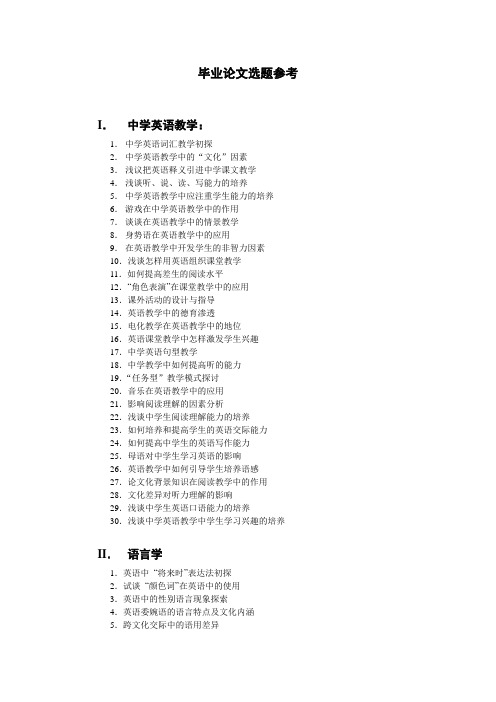
毕业论文选题参考I.中学英语教学:1.中学英语词汇教学初探2.中学英语教学中的“文化”因素3.浅议把英语释义引进中学课文教学4.浅谈听、说、读、写能力的培养5.中学英语教学中应注重学生能力的培养6.游戏在中学英语教学中的作用7.谈谈在英语教学中的情景教学8.身势语在英语教学中的应用9.在英语教学中开发学生的非智力因素10.浅谈怎样用英语组织课堂教学11.如何提高差生的阅读水平12.“角色表演”在课堂教学中的应用13.课外活动的设计与指导14.英语教学中的德育渗透15.电化教学在英语教学中的地位16.英语课堂教学中怎样激发学生兴趣17.中学英语句型教学18.中学教学中如何提高听的能力19.“任务型”教学模式探讨20.音乐在英语教学中的应用21.影响阅读理解的因素分析22.浅谈中学生阅读理解能力的培养23.如何培养和提高学生的英语交际能力24.如何提高中学生的英语写作能力25.母语对中学生学习英语的影响26.英语教学中如何引导学生培养语感27.论文化背景知识在阅读教学中的作用28.文化差异对听力理解的影响29.浅谈中学生英语口语能力的培养30.浅谈中学英语教学中学生学习兴趣的培养II.语言学1.英语中“将来时”表达法初探2.试谈“颜色词”在英语中的使用3.英语中的性别语言现象探索4.英语委婉语的语言特点及文化内涵5.跨文化交际中的语用差异6.反意疑问句的特殊句型7.运用构词法记忆英语单词8.英语中“死亡”委婉语文化因素剖析9.英语学习中的母语负迁移现象探索10.语义模糊与交际11.英汉语言形式与思维方式对比12.中英文化差异在语言中的反映13.英语中主动形式表被动意义14.汉英数量词的文化差异15.英语广告标题的修辞特点16.浅谈英汉词语的文化内涵17.论英汉词义的不对应性III.翻译1.谈英语谚语的翻译2.谈英语幽默的翻译3.英语汉译技巧初探4.台州地方名胜古迹汉译英5.翻译中常见错误分析6.中英思维方式的差异对翻译的影响7.会话含义的推导与翻译8.词汇的文化内涵与翻译9.语境在翻译中的作用10.翻译技巧探索11.商标词翻译12.广告语言的翻译13.论英汉互译中的语义等值问题14.英汉文化差异对翻译的影响15.英汉谚语的理解和翻译16.浅谈颜色词在英语中的翻译17.中西文化差异与翻译障碍18.英语比喻性词语中文化内涵及翻译19.英语意义否定表现法及其汉译20.浅谈新闻标题的翻译IV.英美文学1.英美文学名著(原著200页以上)读后感2.有关文学作品的评论、欣赏等等。
2019年英语专业本科毕业论文参考题目
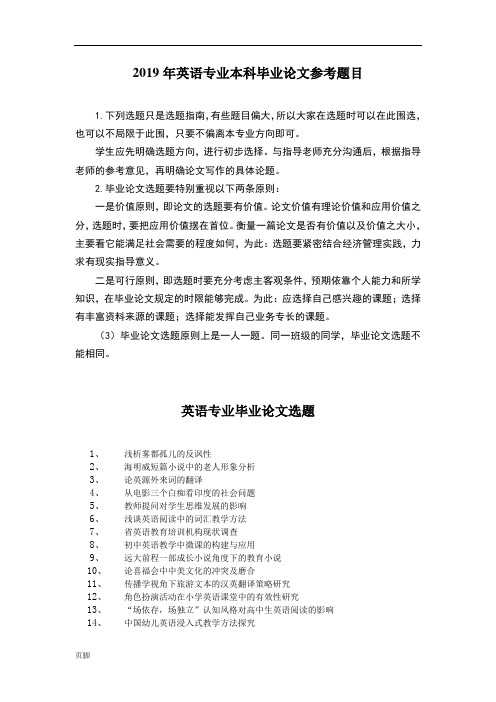
2019年英语专业本科毕业论文参考题目1.下列选题只是选题指南,有些题目偏大,所以大家在选题时可以在此围选,也可以不局限于此围,只要不偏离本专业方向即可。
学生应先明确选题方向,进行初步选择。
与指导老师充分沟通后,根据指导老师的参考意见,再明确论文写作的具体论题。
2.毕业论文选题要特别重视以下两条原则:一是价值原则,即论文的选题要有价值。
论文价值有理论价值和应用价值之分,选题时,要把应用价值摆在首位。
衡量一篇论文是否有价值以及价值之大小,主要看它能满足社会需要的程度如何,为此:选题要紧密结合经济管理实践,力求有现实指导意义。
二是可行原则,即选题时要充分考虑主客观条件,预期依靠个人能力和所学知识,在毕业论文规定的时限能够完成。
为此:应选择自己感兴趣的课题;选择有丰富资料来源的课题;选择能发挥自己业务专长的课题。
(3)毕业论文选题原则上是一人一题。
同一班级的同学,毕业论文选题不能相同。
英语专业毕业论文选题1、浅析雾都孤儿的反讽性2、海明威短篇小说中的老人形象分析3、论英源外来词的翻译4、从电影三个白痴看印度的社会问题5、教师提问对学生思维发展的影响6、浅谈英语阅读中的词汇教学方法7、省英语教育培训机构现状调查8、初中英语教学中微课的构建与应用9、远大前程一部成长小说角度下的教育小说10、论喜福会中中美文化的冲突及磨合11、传播学视角下旅游文本的汉英翻译策略研究12、角色扮演活动在小学英语课堂中的有效性研究13、“场依存,场独立”认知风格对高中生英语阅读的影响14、中国幼儿英语浸入式教学方法探究15、从女性主义角度研究紫色16、基于“互联网+”理念的英语阅读学习模式探究17、英剧神探夏洛克和美剧基本演绎法的比较研究18、礼貌原则在商务英语信函中的应用19、英语专业学生跨文化交际敏感度调查研究20、浅析飞越疯人院中象征主义--制度化社会与人类思想间的较量.21、论他们眼望上苍的叙事艺术22、英语委婉语在英语教学中的应用23、三美论视角下中国古诗英译对比-黄鹤楼送孟浩然之广陵为例24、肯尼斯伯克认同理论下的广告劝说手段25、傻瓜威尔逊中马克.吐温的种族观分析26、解读麦田里的守望者里的道家哲学27、从许渊冲译诗看翻译伦理--以宋词三百首英译为例28、浅析汉英语法相似性及汉语正迁移在中学英语语法教学中的应用29、基于语料库的中国大学生书面语中强势词使用情况的研究30、修辞策略在汽车广告英语中的效用探究31、认知语言学框架下的英汉禁忌语对比研究32、浅析喧嚣与骚动中杰生性格形成的原因33、译者主体性下培基英译散文中特殊词汇的研究34、跨文化视角下中美商务谈判价值观差异对比研究35、从衔接手段角度看汉译英散文翻译--培基英译中国现代散文选36、坠落的人中反叙事诉说创伤与记忆37、礼貌原则下商务谈判中的拒绝策略研究38、功能对等理论视角下2015年政府工作报告中“四字格”词语的汉39、从英汉烹饪类动词语义差异看中式菜名翻译40、基于图示理论的高中英语阅读教学41、麦田里的守望者中霍尔顿的自卑情结42、小学英语阅读教学中的小组合作学习的运用43、新词所折射出的心理因素44、功能对等理论视角下美国情景喜剧字幕翻译研究--摩登家庭为例45、归纳法在初中英语语法教学中运用的现状调查46、中美家庭教育之异同47、释意理论视角下电影海上钢琴师的字幕翻译48、“视界融合”视角下作者自叙三译本的对比研究49、中英环境保护公益广告词汇对比研究50、帮写英语论文喂doogfang51、初中学生在英语阅读教学中自主学习能力的培养52、跨文化交际背景下的中英文禁忌语对比研究53、盖茨比与希斯克里夫爱情悲剧的鲜明对比54、目的论下的商场公示语的翻译55、荣格原型理论下的天黑前的夏天56、目的论视角下服装商标的英译研究57、小说喜福会及它的文化解读58、高中英语写作中的中介语石化现象研究--吴江某高级中学为例.59、从认知和动机素探讨儿童和成人二语习得差异60、从神话人物看中西方文化差异61、一生中的女性意识觉醒62、以马斯洛需求理论分析夜访吸血鬼中路易的行为活动.doc63、茶馆英译本中文化负载词的翻译策略研究64、基于分层教学理论的8A第三单元A Day Out 写作部分的教学设计65、对卡勒德.胡塞尼群山回唱叙事学解读66、英语食品广告中模糊语的研究67、论商务英语信函中的语言经济性原则68、金色笔记中象征手法的运用69、游戏教学法在小学英语课堂教学中的运用70、从修辞角度分析破产姐妹中的美式幽默71、英文商务合同中固定条款的汉译72、听力输入和输出模式对高中生附带词汇习得的影响73、从“归化异化”角度看红楼梦两译本74、功能目的论视角下的时政新闻编译--以G20峰会为例75、傻瓜威尔逊中马克.吐温的种族观分析76、从霍夫斯泰德文化维度理论探究文化差异对中美商务谈判的影响77、从女性主义视角看给樱桃以性别中的英雄主义78、集体主义与个人主义及其在中美家庭生活中的表现79、千万别丢下我中的主要人物命运之分析80、尤金奈达对等翻译理论在本科生教学中的应用--文化背景介绍为81、从红楼梦译本看文化容的翻译82、商标词的翻译原则和方法--从营销心理学视角浅谈83、Analysis of Major Characters in The Great Gatsby.doc84、省略法在中英文翻译中的应用85、试论母语对英语语音习得的影响86、化妆品商标翻译中的创造性87、从桃花源记的翻译看林语堂的翻译美学88、赛珍珠的翻译风格与成因探析--以四海之皆兄弟为例.docx89、从语用学角度浅谈研究语言歧义的意义90、目的论视角下企业简介英译研究--运动品牌外宣为例91、从目的论看口译中的文化因素的处理策略92、中外英文报纸中财经报道的对比分析93、初中英语课堂师生互动探究94、英语情态动词的语义分析及翻译研究--以奥巴马2013就职演说为95、对电影刮痧的文化差异研究96、目的论视角下的中国日报英语新闻标题翻译97、论蝇王的寓言性98、论喜福会母女关系的冲突与融合99、顺应理论下英语新闻的模糊语解析100、真正的伊甸园101、基于功能对等理论的服装商标英译102、英文报刊新闻标题的词汇特色--以时代周刊英国脱欧报道为例. 103、大学生使用非礼貌语的性别差异104、圣经的婚姻观的研究105、追风筝的人中阿米尔的背叛与救赎106、顺应论视角下围城中文化负载词的英译研究107、从浪漫走向现实的新型女性--理智与情感中玛丽安人物分析.do 108、简析美国电影中中国人形象的变迁109、TBLT模式在高校英语专业教学中的运用研究110、从译者主体性视角探究程乃珊的喜福会译本111、从饮食元素角度讨论中美文化差异112、汉语科技文本翻译--功能语言学视角113、从科技伦理观解读弗兰肯斯坦114、在路上中的女性形象分析115、英汉诗歌互译缺陷原因分析及改善策略116、中西禁忌语对比分析117、跨文化视角下的英语习语翻译118、白鲸的生态反思119、钟形罩的女性成长主题研究120、从跨文化角度分析交际中的性别差异121、喜福会中的女性主义解读122、浅析麦琪的礼物中的人文主义情怀123、吹小号的天鹅中路易斯的成长历程--基于认知发展理论的视角. 124、从佩雷尔曼论辩修辞学视角分析奥巴马演讲-以2004年演讲为例125、了不起的盖茨比中的影像化叙事艺术特征126、文化相对论视角下中西方饮食文化差异127、论语中反叙修辞格的翻译策略128、功能对等视角下评温德米尔夫人的扇子中的反讽翻译.docx 129、浅议初中英语阅读课的词汇教学130、教育话语商品化的篇际互文性研究131、海明威笔下的女性形象132、中国古诗词翻译研究之我见133、关于全日制高中网班英语课堂教学师生互动性研究134、驻鲁新建本科院校英语专业毕业生就业现状调查研究135、名利场中反讽手法的运用136、语用策略在商务英语谈判中的重要性研究137、目的论视角下的英语财经报道汉译138、金色笔记中的生态女性主义解读139、目的论视角下化妆品广告的翻译140、论英语广告语中合作原则的遵守与违反141、英语新闻标题中修辞格的翻译策略142、从文化转向角度谈电影字幕翻译策略--少年派的奇幻漂流为例.143、功能对等理论视角下外宣中汉语习语的英译策略研究144、从归化异化的角度分析赤壁的字幕翻译145、生态批评视角下的老人与海146、探讨接受美学理论对商标翻译的应用147、从目的论看化妆品说明书的英译148、从拉康的镜像理论分析藻海无边中女主人公形象149、语用策略视角下商务英语谈判僵局的破解研究150、英国脱欧新词的构词及翻译151、项目化教学与国际商务英语人才的培养152、网络环境下中国英语对英语词汇的影响研究153、看得见风景的房间从文字到影像154、探究最蓝的眼睛中美国梦的异化155、从归化与异化角度研究谈治国理政的中国特色词英译.do 156、在关联理论视角下浅谈雷雨的翻译157、浅析乞力马扎罗的雪中哈里的生死观158、汉英寒暄语差异研究159、在高中英语课堂中发展学生跨文化交际能力的研究160、探究基于建构主义理论下的初中英语词汇教学161、跨文化交际中中西方的禁忌习俗研究162、修辞学视角下的英语广告翻译研究163、英语广告中歧义的语用功能164、美国废奴运动兴起的原因--浅析汤姆叔叔的小屋165、咖啡店名的语言文化特征研究166、功能对等视角下对生活大爆炸字幕中双关语翻译研究167、宠儿中的哥特元素解析168、目的论视角下的英文电影片名的汉译169、从目的论视角看围城英译本的对话翻译170、儿童文学视角下哈利.波特两中译本的翻译研究与比较171、浅析中西方饮食文化差异172、爵士乐与美国黑人文学--以托尼莫里森爵士乐为例173、本科生毕业论文摘要英译的典型错误及原因分析174、礼貌原则视角下唐顿庄园中的会话分析175、麦田里的守望者中霍尔顿的人物性格分析176、由“高分低能”引起的对改进高中英语教学方法的探究177、从女性主义解读他们眼望上苍178、从狄更斯的小说看维多利亚前期的儿童179、迷失在都市中--嘉莉妹妹欲望解析180、论翻译理论对译本的影响--黄鹤楼送孟浩然之广陵为例.doc 181、从女性主义角度分析南方淑女形象的消亡--欲望号街车布兰奇为182、喜福会中中美家庭价值观差异的跨文化解读183、基于微课的翻转课堂在大学英语口语教学中的应用184、任务型教学法在初中英语听力教学中的应用185、中美家庭文化差异的比较研究--以电影推手为例186、冰与火之歌的叙事技巧分析187、灿烂千阳的女性主义解读188、试论英语语言中的性别歧视189、浅析男权社会的牺牲品--了不起的盖茨比中的黛西190、英语专业大学生口语障碍及对策研究191、英语专业课程学业成绩评价现状及提升策略研究192、从认知隐喻角度看英语商标翻译193、翻译过程中欧化汉语现象的研究194、论文化差异对中美商务谈判的影响195、美裔作家的中国文化情结--以健秀为例196、最蓝的眼睛和秀拉女性的成长主题197、近五年中美政治文献中AS使用的对比研究198、功能目的论视角下国产电影片名英译研究199、浅析肖申克的救赎中主人公对人格自由的追求200、从后殖民女性主义视角浅析他们眼望上帝201、英汉物称主语对比研究202、从雾都孤儿看资本主义社会对孤儿成长的影响203、翻译生态学视角下阿Q正传中文化负载词的英译研究204、解读看得见风景的房间中露西心的双重文化冲突205、红楼梦中“粥”食类翻译的文化缺失206、浅析中美文化差异对商务谈判的影响207、英语电视剧字幕的特点与翻译策略208、英语师专业学生的跨文化意识培养209、跨文化交际背景下的英语委婉语应用研究210、建构主义教学模式在中国英语专业课堂实施过程中存在的问题及211、论无名的裘德中淑的异化212、中式英语和中国英语的语言特征及成因的比较213、从语用角度看广告英语双关语翻译214、师生实习过程中身份认同的发展特点215、黑人女性的追求自我之路--秀拉的女性主义解读216、从接骨师之女分析华裔对中国文化的态度217、模因论视角下的商业广告翻译218、旅游翻译中的文化缺省及其补偿策略的研究--以旅游宣传册为例219、从功能对等理论看英语广告中双关语的翻译技巧220、学前英语教师的专业发展221、女性电影中的东西方文化比较222、英语新闻标题的语言特征及其翻译223、模糊容忍度与大学生英语阅读水平及阅读策略的相关性研究.do 224、合作原则视角下电视剧欢乐颂中的会话分析225、从顺应理论角度浅析美国总统演讲语篇中的政治委婉语226、从目的论视角看纪录片中国故事的中国文化负载词英译.doc 227、初中生英语学习兴趣培养研究228、基于语料库的英语动源介词和连词的语类分布差异探析229、从唐顿庄园看女权主义在20世纪英国的发展。
提高英语阅读能力英文作文
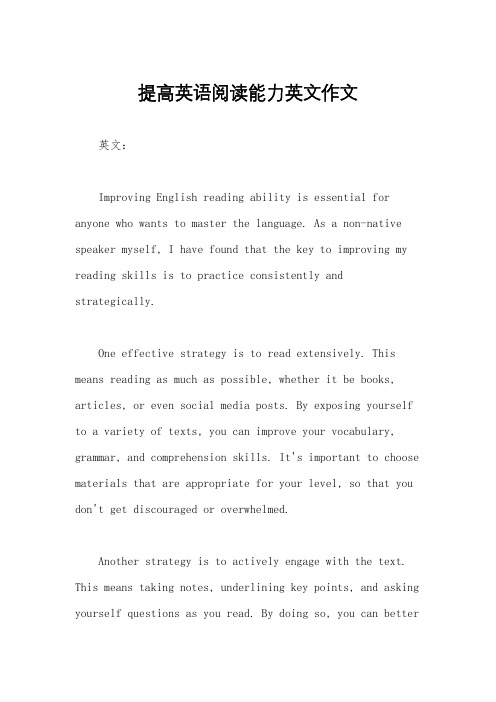
提高英语阅读能力英文作文英文:Improving English reading ability is essential for anyone who wants to master the language. As a non-native speaker myself, I have found that the key to improving my reading skills is to practice consistently and strategically.One effective strategy is to read extensively. This means reading as much as possible, whether it be books, articles, or even social media posts. By exposing yourself to a variety of texts, you can improve your vocabulary, grammar, and comprehension skills. It's important to choose materials that are appropriate for your level, so that you don't get discouraged or overwhelmed.Another strategy is to actively engage with the text. This means taking notes, underlining key points, and asking yourself questions as you read. By doing so, you can betterretain information and develop critical thinking skills. Additionally, it's helpful to read aloud or discuss thetext with others, as this can improve your pronunciationand fluency.Lastly, it's important to have a positive attitude and be patient with yourself. Improving reading ability takes time and effort, but with consistent practice and the right strategies, it is achievable.中文:提高英语阅读能力对于想要掌握这门语言的任何人都是必要的。
西南大学网络与继续教育学院英语教育专业毕业论文(设计)写作细则及论文题目
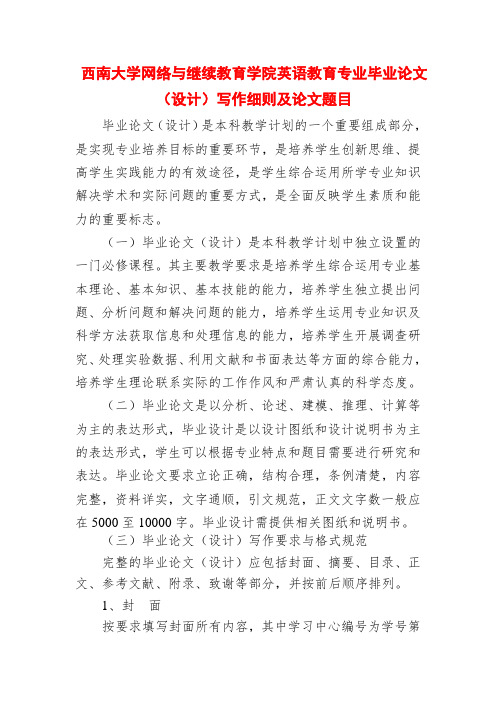
西南大学网络与继续教育学院英语教育专业毕业论文(设计)写作细则及论文题目毕业论文(设计)是本科教学计划的一个重要组成部分,是实现专业培养目标的重要环节,是培养学生创新思维、提高学生实践能力的有效途径,是学生综合运用所学专业知识解决学术和实际问题的重要方式,是全面反映学生素质和能力的重要标志。
(一)毕业论文(设计)是本科教学计划中独立设置的一门必修课程。
其主要教学要求是培养学生综合运用专业基本理论、基本知识、基本技能的能力,培养学生独立提出问题、分析问题和解决问题的能力,培养学生运用专业知识及科学方法获取信息和处理信息的能力,培养学生开展调查研究、处理实验数据、利用文献和书面表达等方面的综合能力,培养学生理论联系实际的工作作风和严肃认真的科学态度。
(二)毕业论文是以分析、论述、建模、推理、计算等为主的表达形式,毕业设计是以设计图纸和设计说明书为主的表达形式,学生可以根据专业特点和题目需要进行研究和表达。
毕业论文要求立论正确,结构合理,条例清楚,内容完整,资料详实,文字通顺,引文规范,正文文字数一般应在5000至10000字。
毕业设计需提供相关图纸和说明书。
(三)毕业论文(设计)写作要求与格式规范完整的毕业论文(设计)应包括封面、摘要、目录、正文、参考文献、附录、致谢等部分,并按前后顺序排列。
1、封面按要求填写封面所有内容,其中学习中心编号为学号第4至第6位。
2、摘要摘要是对论文的内容不加注释和评论的简短陈述,是文章内容的高度概括,主要包括研究的内容、目的、方法、成果、结论及其意义,一般为300~500字。
摘要一般不列举例证,不描述研究过程,不做自我评价。
论文摘要后另起一行注明本文的关键词,关键词是供检索用的主题词条,应采用能够覆盖论文内容的通用专业术语,符合学科分类,一般为3~5个,按照词条的外延层次从大到小排列。
3、目录独立成页,包括摘要,正文中的一级、二级标题,参考文献、附录、致谢等项目所在的页码。
阅读英语报纸对学习英语的好处毕业论文设计
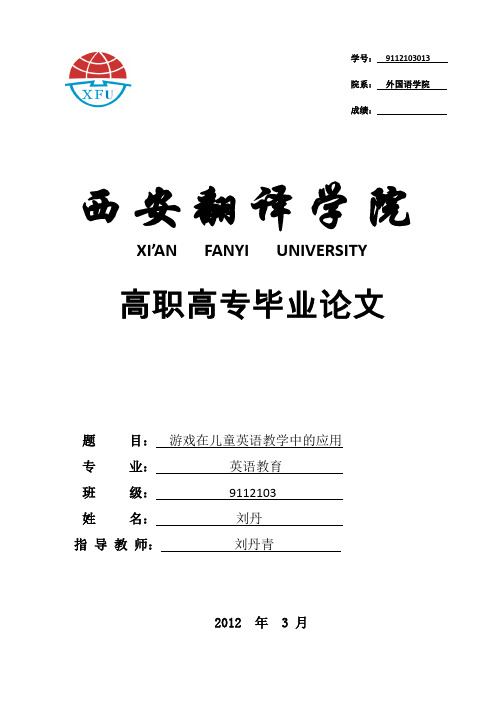
学号:9112103013院系:外国语学院成绩:西安翻译学院XI’AN FANYI UNIVERSITY高职高专毕业论文题目:游戏在儿童英语教学中的应用专业:英语教育班级:9112103姓名:刘丹指导教师:刘丹青2012 年 3 月阅读英语报刊对英语学习的好处刘丹(西安翻译学院外国语学院 710105)摘要:英语学习是一个理论与实践的过程,是一个不断积累与运用的过程。
然而,只有通过大量的阅读,才能获得最大的实践量,才能灵活自如的运用。
英语报刊代表着英语最新的发展趋势,许多新的词汇和短语往往最先出现在报刊之中,由于报刊选材广泛,内容丰富,贴近学生的生活,有利于培养学生的学习兴趣和激发学生的学习动力。
学生通过读英语报刊不仅可以了解国内外的大事,而且可以提高阅读能力,在增加知识面的同时也开阔了视野。
同时,掌握一定的阅读方法,往往可以有效的进行阅读,达到事倍功半的效果。
关键词:学生英语学习英语报刊阅读Reading English newspapers and periodicals on the benefits of learning EnglishAbstract:Englisn learning is a process of combining theories and practices, and also a process of gradually accumulation and operation.nevertheless,only through reading a large number of English materials can we achieve the maximal practices so that we can use English flexibly at last .English newspapers represents the latest trent of English development. In general, a great deal of new vocabularies and phrases initially appears in newspapers, it's wide range in choosing materials and richful content, which are closely related to students' life, made it possible to cultivate students' interest and motivation of English learning. By reading newspapers, students will have access to the current affairs from home and abroad, besides, through which they will gain an improvement in reading ability, enrich their knowledge, and broaden their horizon as well. What’s more, if we master some reading skills, we can read newspapers more effectively with less effort.Keywords: students reading English learning English newspapers一、绪论英语学习是一个听说读写译全面结合的过程,是一个学习与运用的过程。
英语毕业论文题目
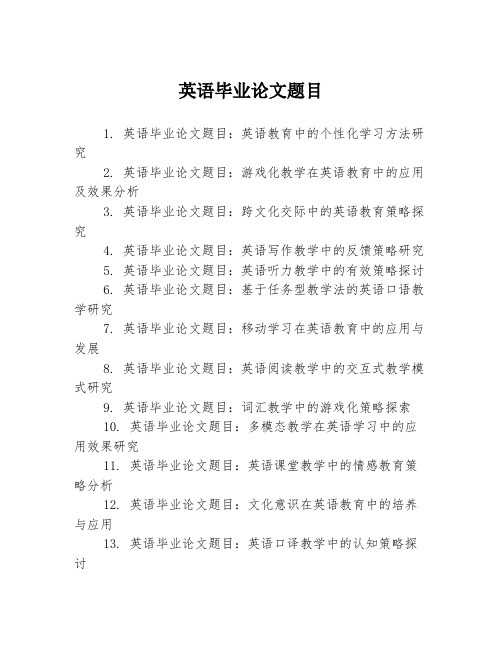
英语毕业论文题目
1. 英语毕业论文题目:英语教育中的个性化学习方法研究
2. 英语毕业论文题目:游戏化教学在英语教育中的应用及效果分析
3. 英语毕业论文题目:跨文化交际中的英语教育策略探究
4. 英语毕业论文题目:英语写作教学中的反馈策略研究
5. 英语毕业论文题目:英语听力教学中的有效策略探讨
6. 英语毕业论文题目:基于任务型教学法的英语口语教学研究
7. 英语毕业论文题目:移动学习在英语教育中的应用与发展
8. 英语毕业论文题目:英语阅读教学中的交互式教学模式研究
9. 英语毕业论文题目:词汇教学中的游戏化策略探索
10. 英语毕业论文题目:多模态教学在英语学习中的应用效果研究
11. 英语毕业论文题目:英语课堂教学中的情感教育策略分析
12. 英语毕业论文题目:文化意识在英语教育中的培养与应用
13. 英语毕业论文题目:英语口译教学中的认知策略探讨
14. 英语毕业论文题目:写作评价方法在英语写作教学中的应用
15. 英语毕业论文题目:虚拟现实技术在英语学习中的应用及效果评估
16. 英语毕业论文题目:英语语法教学中的情景教学法研究
17. 英语毕业论文题目:自主学习在英语学习中的应用与促进
18. 英语毕业论文题目:英语听力教学中的课堂互动策略探索
19. 英语毕业论文题目:语篇教学在英语阅读教学中的应用研究
20. 英语毕业论文题目:英语教育中跨学科教学的探索与实践。
【英语】英语专业毕业论文开题报告格式及范文1
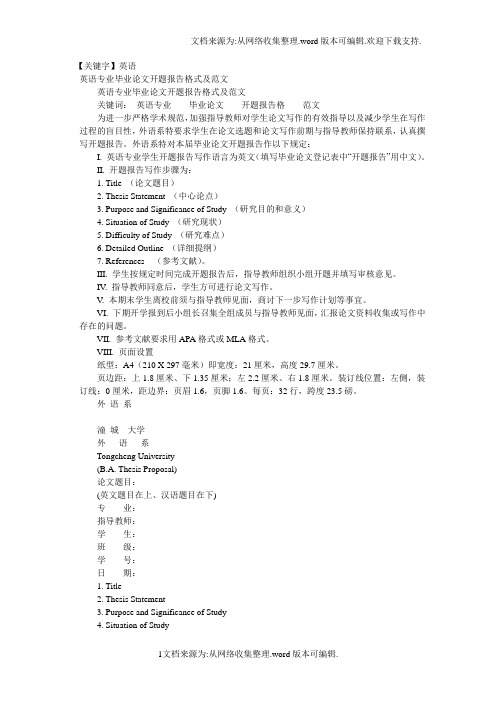
【关键字】英语英语专业毕业论文开题报告格式及范文英语专业毕业论文开题报告格式及范文关键词:英语专业毕业论文开题报告格范文为进一步严格学术规范,加强指导教师对学生论文写作的有效指导以及减少学生在写作过程的盲目性,外语系特要求学生在论文选题和论文写作前期与指导教师保持联系,认真撰写开题报告。
外语系特对本届毕业论文开题报告作以下规定:I. 英语专业学生开题报告写作语言为英文(填写毕业论文登记表中“开题报告”用中文)。
II. 开题报告写作步骤为:1. Title (论文题目)2. Thesis Statement (中心论点)3. Purpose and Significance of Study (研究目的和意义)4. Situation of Study (研究现状)5. Difficulty of Study (研究难点)6. Detailed Outline (详细提纲)7. References (参考文献)。
III. 学生按规定时间完成开题报告后,指导教师组织小组开题并填写审核意见。
IV. 指导教师同意后,学生方可进行论文写作。
V. 本期末学生离校前须与指导教师见面,商讨下一步写作计划等事宜。
VI. 下期开学报到后小组长召集全组成员与指导教师见面,汇报论文资料收集或写作中存在的问题。
VII. 参考文献要求用APA格式或MLA格式。
VIII. 页面设置纸型:A4(210 X 297毫米)即宽度:21厘米,高度29.7厘米。
页边距:上1.8厘米、下1.35厘米;左2.2厘米、右1.8厘米。
装订线位置:左侧,装订线:0厘米,距边界:页眉1.6,页脚1.6。
每页:32行,跨度23.5磅。
外语系潼城大学外语系Tongcheng University(B.A. Thesis Proposal)论文题目:(英文题目在上、汉语题目在下)专业:指导教师:学生:班级:学号:日期:1. Title2. Thesis Statement3. Purpose and Significance of Study4. Situation of Study5. Difficulty of Study6. Outline7. References开题过程:论文小组长(签名):日期:指导教师意见:指导教师签名:提高英语阅读速度的主要障碍摘要:本文从培养良好的阅读习惯和掌握科学的阅读方法等四个方面简要地介绍了提高英语阅读速度的技巧。
- 1、下载文档前请自行甄别文档内容的完整性,平台不提供额外的编辑、内容补充、找答案等附加服务。
- 2、"仅部分预览"的文档,不可在线预览部分如存在完整性等问题,可反馈申请退款(可完整预览的文档不适用该条件!)。
- 3、如文档侵犯您的权益,请联系客服反馈,我们会尽快为您处理(人工客服工作时间:9:00-18:30)。
Cultivating High School Students’ English Reading Interest and AbilitybyA thesis presented to the School of English EducationofXi’an International Studies Universityin partial fulfillment of the requirementsfor the degree ofBachelor of ArtsMay 20, 2013Class:Advisor:外国语大学毕业论文开题报告AcknowledgementsI would like to express my sincere thanks to all who have helpedme through various ways for my writing of this thesis.Firstly, I am deeply grateful to my supervisor, Ms Jing, for her continuous encouragement and expert supervision. Ms Jing gave me many invaluable instructions and helped me much in every stage of my thesis writing. Secondly, I would like to express my heartfelt gratitude to Professor Hai, and teachers at the Department of English, who have instructed and helped me a lot in the past two years.Moreover, my numerous thanks go to my dear friends and my lovely classmates, who spent much time with me on my thesis. Thanks should also be given to the directors and teachers for my college. What they taught me has paved a way for my writing of the thesis.Finally, I would like to offer my sincere gratitude to those who spend their precious time in reading this thesis.培养中学生英语阅读兴趣和能力摘要:阅读是获取信息、扩大知识面的重要手段,并在英语教学中占有非常重要的位置。
同时,由于近年来高考试题中的阅读量在不断增加,因此培养学生的阅读兴趣和能力越来越被广大中学师生所重视,中学英语学科课程标准更是将培养学生的阅读能力作为主要的教学目标之一。
但是目前,我国中学生英语阅读量严重不足。
由于课业负担重,考试负担重,有些学生缺乏英语阅读兴趣,甚至对阅读怀有恐惧心理,阅读失分率较高;有些学生仅能应付解题,完成一定的课外作业,满足于读课文等有限的语言资料,因而中学英语阅读兴趣和能力的培养可以说是任重道远。
本文通过阐述阅读的重要性,分析目前中学生的阅读现状和制约中学生阅读能力的因素,然后论述在英语阅读课堂中的教学技巧和策略,同时提出怎样的教学技巧和策略可以更有效地培养学生的英语阅读兴趣、提高英语阅读能力。
希望能为中学的课堂教学研究尽一份自己的绵薄之力。
关键词:英语阅读;课堂教学;培养兴趣;能力;教学技巧;策略Cultivating High School Students’ English Reading Interestand AbilityAbstract:Reading has always been regarded as an important method to acquire information and expand knowledge, and it occupies a very important position in the teaching of English. Meanwhile, due to the increasing amount of reading in the College Entrance Examination in recent years, cultivating students’ English reading interest and ability has attracted more and more attention from all the high school teachersand students, and the high school English curriculum standards even takes it as the main teaching goal. However, high school students’English reading has been a serious shortfall in our country now. Because of the heavy academic burden and too many exams, some students are lack of interest in reading, even fear to read; some students can only cope with simple reading comprehension questions and complete homework. They are satisfied with reading the limited language materials–textbooks. Therefore, cultivating high school students’ English reading interest and ability can say a long way to go. By describing the importance of reading, analyzing the status quo of current high school students’English reading and the factors restricting high school students’ English reading abilities, this thesis mainly discusses the strategies and skills in teaching English reading, and proposes which strategies and skills can cultivate high school students’English reading interest and ability effectively. Here I humbly hope that my thesis can make a contribution for the secondary English classroom teaching.Key words: English reading; classroom teaching; cultivate interest;ability; teaching skills; strategyTable of Contents1. Introduction (1)2. The importance of cultivating high school students’ English reading interest and ability (1)3. The probl ems of high school students’ English reading (4)3.1 Incorrect reading techniques (4)3.1.1 Reading word by word (4)3.1.2 Psychological translation and structure analysis (5)3.1.3 Reread the sentence from bottom to up (5)3.1.4 Referring too much to dictionary (5)3.2 Inadequate guidance from the teacher (6)4. Principles and models for teaching reading (8)4.1 Principles (8)4.2 Bottom-up model (9)4.3 Top-down model (10)4.4 Interactive model (10)5. The ways to cultivate high school students’ English reading interest and ability (11)5.1 Teachers’ instructive strategies (11)5.1.1 Strategy of cooperation (11)5.1.2 Strategy of role exchange (13)5.1.3 Strategy of picture application (13)5.2 Students’ general English reading skills (13)5.2.1 Predicting (14)5.2.2 Skimming (15)5.2.3 Scanning (15)5.2.4 Guessing skill (16)6. Conclusion (17)References (19)1. IntroductionEnglish reading has always been considered as one of the most important parts of English learning. Actually, reading is a process of mentally interpreting written symbols. It involves a series of factors that a reader brings to a text. These factors include reading ability to monitor their own comprehension, decode unknown words and fix-up strategies. Reading ability includes understanding ability and reading speed. Understanding consists of the understanding of the surface structure and the deep meaning that author expresses. Whether reading ability is good or not depends on reading speed as well as understanding level. Reading speed and reading comprehension are two elements that can not be separated. Poor reading comprehension surely results in slowdown reading speed. Neglect of reading speed must have bad effect on reading comprehension.As reading is a part of academic literacy, English teachers usually have high expectations of a student’s ability to cope with the demand of reading in English. Most students wish to read more books. Reading is a way for students to possess more knowledge and pass many kinds of examinations. However, it is also an activity that many students don’t like very much. To succeed at schools, students need to possessa range of strategies and skills to support self-directed learning. Traditionally, many of these strategies and skills, some of which are highly generic, are not explicitly taught to students in the expectation that students either already have these skills, or will naturally acquire and develop these skills in their course of study. In order to improve the students’ ability we may have to answer the follow questions: what are the English reading habits of students? Which strategies and skills we should use in English reading?2. The importance of cultivating high school students’English reading interest and abilityAs reading is very much a part of our daily life, we hardly consider the processes involved and we rarely ask the question: ‘what is reading?’ According to Day and Bamford (1998:12), ‘reading is the construction of meaning from a printed or written message.’ In other words, reading comprehension involves extracting the relevant information from the text as efficiently as possible, connecting the information from the written message with one’s own knowledge to arrive at an understanding. Reading is a silent and individual activity since the writer’s intention was for the text to be read rather than heard. There are two broad levels in the act of reading: i) a recognition task of perceiving visual signals from the printed page through the eyes;ii) a cognitive task of interpreting the visual information, relating the received information with the reader’s own general knowledge, and reconstructing the meaning that the writer had meant to convey.Reading has always been regarded as an important method to acquire information and expand knowledge, and it occupies a very important position in the teaching of English. In recent years, reading comprehension takes up more than 30% in the college entrance examination paper, and the high school English curriculum standards even takes it as the main teaching goal. This further requires that we must pay attention to cultivate students’reading comprehension ability in English teaching. However, high school students’ English reading has been a serious shortfall in our country now. Because of the heavy academic burden and too many exams, some students are lack of interest in reading, even fear to read; some students can only cope with simple reading comprehension questions and complete homework. They are satisfied with reading the limited language materials–textbooks. A lot of readings appear in an examination. But all these readings must be done in limited time. So students are asked to read them correctly and with a certain speed. To do this, they should change their bad reading habit and raise their reading efficiency. Therefore, cultivating high school students’ English reading interest and ability can say a long way to go.1.Reading in different ways for different purposesThink about the things you often read: statistics, label on medicine bottle, letter, notice, application form, street map, etc. Why did you read each one? What did you want to get from it? Was it only information? What about the letter from home? And the detective novel? You will find that you had a variety of reasons for reading, and if you ask other people this question, you would find different reasons again.Now think about the way you read each item. How did the various reasons influence this? Do you read a piece of notice the same way as a poem? How about a street map or a letter? Reading these is very unlike reading a book.The way you tackled each text was strongly influenced by your purpose in reading. Quickly scanning a page to find someone’s telephone number is very different from perusing a legal document. You probably noticed big differences in the speed you used. Did you also find that in some cases you read silently while in others you read aloud? What were the reasons that led you to articulate what you read? For most of us, reading aloud is uncommon out side the classroom.2.Reading for meaningWhatever your reasons for reading (excluding any reading for language learning), it is not very likely that you were interested in the pronunciation of what you read, and even less likely that you wereinterested in the grammatical structures used. You read because you wanted to get something from the writing. We will call this the message: it might have been facts, but could just as well have been enjoyment, ideas, and feelings (from a family letter, for instance). (Nuttall, C. 2002:3).3.Why do people read in foreign language?Perhaps the advantages of knowing a foreign language are clear to your students - better jobs, access to literature or whatever. Reading is usually recognized as a necessary part of these activities. However, if the only foreign language items you have read recently were directly concerned with your teaching, it may be that you and your students too, do not really need to read that language except for classroom purposes.If this is the case, we must not be surprised if students’motivation is low. This is a major problem for many language teachers: the motivation of needing to read is powerful. However, you can also motivate students by making their foreign language reading interesting in itself. The language is alive - its users have the same variety of purposes for reading as anybody has when reading their mother tongue - and this fact can be used by teachers to increase motivation.4.Getting a message from a textWe shall assume, therefore, that reading has one overriding purpose: to get meaning from a text. Other ways of looking at readingwill not concern us. Our business is with the ways a reader gets a message from a text. So we will begin by establishing what we mean by a message.3. The problems of high school students’ English readingNowadays, in most senior high school, although reading is regarded as an important subject, the teaching effect is not satisfying. One reason is that some students do not know about the correct reading techniques. Another reason is that some teachers neglect to guide the students how to read and what to read. Teaching does not satisfy the need of learning.3.1 Incorrect reading techniquesAs we all know, reading process is individual. Different readers have different study habits and interests, so they will meet with some problems in reading. High school students have some bad habits in reading.3.1.1 Reading word by wordReading word by word is a psychological process. According to psychologists’ study in reading, when people are reading, the eyeballs move with a leap rather than move word by word. Information comes into your brain through some key words connecting to guess sum-upand shape main idea rapidly. Students’word by word readings not only slow down the speed of reading, but also affect the overall understanding. For example: “pick up”. He picked me up on my way home. In the context of the specific circumstances, the phrase means he gave me a free ride (顺便载你一程). But I just picked English up, it means “just started to learn (刚刚开始学)”. If you take for granted for the literal meaning of “pick up”, which means “take hold of something (把…捡起来)”, it will inevitably lead to the erroneous understanding of the entire sentence. Even if some students can understand the meaning of each word or a phrase. Someone reads with his finger pointing to the words or with his head shaking. Those are all bad habits. You should read phrase by phrase. Do not shake your head, just move your eyeballs. That’s enough. If you want to get more words, information, there must be a proper distance between your eyes and the reading material.3.1.2 Psychological translation and structure analysisMany high school students cannot understand the material directly when they are reading, they are inclined to translate while reading in their heart. Through this way they understand the meaning of English sentence, the significance of the paragraph. Some high school students like to analyze the grammar structure of the sentence or pay more attention to individual word, phrase, the sentence patternor the fixed usage in the article while reading.3.1.3 Reread the sentence from bottom to upWhen students are reading, they are in habit of rereading the sentence or the part of the paragraph which they have just read. This kind of phenomenon is extremely common in high school. Some students like to read the line which was just finished from its end to the beginning. After they finished one line, they couldn’t fix their eyes on the start of the second line, but to reread the first sentence from its end to beginning. These three bad reading habits I have mentioned above will lead to the lower reading speed.3.1.4 Referring too much to dictionaryCharles Chaplin said: “you have to believe in yourself.” That’s the secret of success when students meet new words and phrases in sentence; they look them up in the dictionary at once rather than guessing the meaning by themselves. Look at the following examples: a. half a year after her marriage, Mrs. White was with child. Here “with child” is a new phrase in the sentence. One of the reasons is that there is no article before the phrase, but as long as you consider carefully with the context, you can understand the meaning of the phrase is pregnancy; b. John is a thief, he ever wants to steal the gold teeth in his grandma’s mouth. There are two block words, but as long as you know one word, you can nearly guess the meaning of the other word.3.2 Inadequate guidance from the teacherSince the students have so many bad reading habits, the teacher needs to guide them how to read and what to read. We have talked about the guidance of how to read (reading techniques) above, and here we mainly talk about the guidance of what to read.1. Why teachers need to assess textsAs I have mentioned in the introduction part, ‘because of the heavy academic burden and too many exams, some students are lack of interest in reading, even fear to read; some students can only cope with simple reading comprehension questions and complete homework. They are satisfied with reading the limited language materials–textbooks.’Therefore, as an English teacher, even if you have little control over the choice of textbooks, it helps to be aware of their strong points and limitations so that you can exploit them effectively, supplement them if necessary, and perhaps argue the case for their replacement.Probably, too, you often have to look for material to fill a gap or to deal with a particular problem that you have not experienced before. Indeed, some classes have such specific needs that most of the material must be collected by the teacher. So you are likely to find yourself having to evaluate texts for reading development.2. Assessing the students’ levelIf you know the class, you already have a good idea of what vocabulary and structures they are familiar with. If you do not know the class well, you have to find this out. You may be able to make use of vocabulary and structure lists supplied in the syllabus or textbooks used in earlier years. However, we all know that the presence of a word on a list does not guarantee that the students have learnt it, any more than its absence proves that they do not know it.If the students have varied backgrounds, a period of trial and error is unavoidable. However, a series of grade cloze tests can give you an idea of their levels. The result can only be approximate, because the tests sample only a tiny percentage of what they know, but even limited information is better than none during the first few weeks with a new set of students.A range of levels is likely in any one class; many teachers have to cope with classes where the gap between the strongest and weakest students is very wide. In an ideal word, every student would have material appropriate to his own needs. A library for extensive reading should certainly cater for the full range of levels. And classroom lessons can be valuably supplemented by self-access work at a variety of levels.However, most teachers work in circumstances where it is not possible to provide differentiated learning materials for regular classroom use. We shall assume that you have to compromise bychoosing material that suits most of the class, and that you compensate for this by giving individual attention to students who are behind the others, or are capable of handling more difficult material.3. Finding out what students likeSuggesting that you look for motivating material implies that you know what interests the students. Are you sure you do? It is worth carrying out an investigation, especially if you are planning to invest money (whether in class texts or extensive reading materials). There are several factors to bear in mind if you do decide to survey students’reading tastes.First, be cautious about questionnaire responses. For instance, in some countries the classics (Shakespeare, Dickens and so on, in the case of English) retain a strong position. People may name such writers because they consider it the proper thing to do, even if they don’t really enjoy them. Don’t rely only on their stated preferences, even expressed anonymously.One way to double - check is to find out what students actually read, bearing in mind that books read in the L1 may tell you more about reading tastes than those in the foreign language. For instance, find out which books are borrowed most often from the library: this is usually a reliable indicator of preferences. Keep an eye open for the sort of reading matter the students usually carry with them. If it does notinclude works of literary merit, there is no need to be surprised. But you might consider providing similar material in the target language: if the students want to read it, half the battle has been won.Finally, monitor the popularity of the materials you choose, and be prepared to change.4. Selecting texts for classroom studyAn enquiry of this kind particularly affects the choice of books for extensive reading, but has implications for classroom texts as well. You may not want to study in class the sort of material that has the most immediate appeal for your students; comics, romances and thrillers have been used successfully by some teachers, but others prefer less controversial material for actual lessons. Nevertheless, you need texts that will interest most of the students and will not actually bore the others; and it is much easier to teach well if the texts interest you, too.In addition to being interesting, some classroom texts at least should represent the kind of material students will need to handle after they leave the foreign language class. Sometimes these criteria conflict, but not only you can decide how to balance them. It is often better to begin on material chosen chiefly for enjoyment, until reading skills improve. And even if you are training students specifically to read, for instance, university medical texts, you may get better results if you use simpler and more motivating material to begin with. School textbooksoften provide simple models of academic discourse; it is useful to have a collection of them (in the foreign language) on subjects suited to the class.4. Principles and models for teaching reading4.1 PrinciplesWhen teaching reading, great care should be taken regarding how we should teach, which involves materials selection, task design, students motivation and skills development.●The selected texts and attached tasks should be accessible to thestudents. Inaccessible texts and tasks do not help improve students’ reading skills but cause frustration.●Tasks should be clearly given in advance. Preferably, tasks shouldmotivate students.●Tasks should be designed to encourage selective and intelligentreading for the main meaning rather than test the students’understanding of trivial details.●Tasks should help develop students’ reading skills rather than testtheir reading comprehension. If you always ask students to read passages then answer multiple choice questions, you are actually testing them not developing their reading skills.●The teacher should help students not merely to cope with oneparticular text in class but to develop their reading strategies and reading ability in general so that they are able to apply the strategies or skills learned in class to tackle other texts they encounter outside class or in the future.●The teacher should provide enough guidance and assistance at thebeginning to help students read and develop reading strategies but gradually withdraw his/her guidance as students progress so that they eventually become independent readers.4.2 Bottom-up modelThe way one teaches reading always reflects the way one understands reading and the reading process. Some teachers teach reading by introducing new vocabulary and structures first and then going over the text sentence by sentence and paragraph by paragraph with the students. This is then followed by questions and answers to check comprehension. Also a lot of time is spent on having students read aloud the text. This way of teaching reflects the belief that reading comprehension is based on the mastery of the new words and new structures as well as a lot of reading aloud practice. It basically follows a linear process from the recognition of letters to words, to phrases, to sentences, to paragraphs, and then to the meaning of the whole text. This way of teaching is known to follow a bottom-up model.4.3 Top-down modelHowever, a different view believes that one’s background knowledge plays a more important role than new words and new structures in reading comprehension. For example, we all have experiences of reading something that does not contain any new words or new structures, but we still fail to understand its overall meaning. In other cases, we may read an article which contains quite a number of new words as well as difficult structures with reasonable understanding. This is because we have made use of our knowledge about the topic to assist our comprehension. Therefore, it is believed that in teaching reading, the teacher should teach the background knowledge first so that students equipped with such knowledge will be able to guess meaning from the printed page. This process of reading is said to follow the top-down model. Just as Goodman (1967) once said reading is ‘psycholinguistic guessing game’.4.4 Interactive modelThe current theory views reading as an interactive process. That is to say, the brain receives visual information and at the same time, interprets or reconstructs the meaning the writer had when he wrote the text. This process does not only involve the printed page but also the reader’s knowledge of the language in general, of the world, and of the text types. During the process of reading, all these factors interact witheach other and compensate for each other. Therefore, a proficient reader should have good language skills: automatic recognition of words and phrases, understanding sentence structures, building a discourse structure, etc. Then he integrates this decoding process with what he/she already knows about the topic. One’s general knowledge about the world and about the text types are known as schemas or schemata, which has been described as the ‘cognitive constructs which allow for the organization of information in our long-term memory’ (Widdowson, 1983). During the reading process, our mind by interacting with the printed page – its words, phrases, sentences, as well as the context it provides can be stimulated and a proper schema will be activated to allow us to relate the incoming information to already known information. If we do not have the type of necessary schema for a particular reading text, let’s say cultural specific knowledge, we may have to resort heavily to other knowledge which is available, such as our linguistic knowledge and text type knowledge to aid our comprehension. Similarly, when we do not have the necessary linguistic knowledge, we will have to resort to our world knowledge to help ease the difficulties in comprehension. Obviously, a good knowledge base of all the above is essential for good reading comprehension and we believe a good linguistic basis is the fundamental as far as foreign language reading in concerned.Based on the understanding of reading as an interactive process, teaching reading in the classroom divides the teaching procedures into basically three stages in which bottom-up and top-down techniques are integrated to help students develop their reading strategies and increase their language efficiency in general. The three stages are pre-reading, while-reading, post-reading.5. The ways to cultivate high school students’ Englishreading interest and ability5.1 Teachers’ instructive strategiesMany reading techniques and advices have been talked in this thesis. And in order to avoid the problems mentioned above in the real classroom teaching, teachers should know some teaching strategies to carry on their teaching effectively.5.1.1 Strategy of cooperationTo improve students’ reading ability and enlarge their vocabulary through cooperation is a comparatively effective way, especially for classes with variety of learning levels. There are altogether four parts: 1. Preparation before readingThe goal of this stage is: Make the students to know the information of the article which will be read as many as possible in the short time. Forecast the information which is going to be involved in the article may stimulate their interest in what they are reading, and servethe reading in the next step. It includes two parts:a. Students can acquire some information in reading by inciting their brains. For instance, students are given ninety seconds to write all the information related to the topics, and then gather their information in one minute.b. Students are encouraged to forecast what the material is going to say or they are asked to write down.2. Detail readingThe aim of this stage is to train the students to monitor their own understanding of a material. Let them know which part they could understand, which part cannot. When the students have determined the paragraph which they don’t understand, they may through the following way to read effectively.(1) Picking out the key words.(2) Searching the former sentence and the following one.(3) Seeking the prefix and the suffix of the new word.3. The understanding of the general ideaIn this stage, students have to do the following parts:a. Seeking for the main time, place, and event in the paragraph and so on.b. Using their own words to introduce the most important viewpoint about these characters, places, as well as events.。
